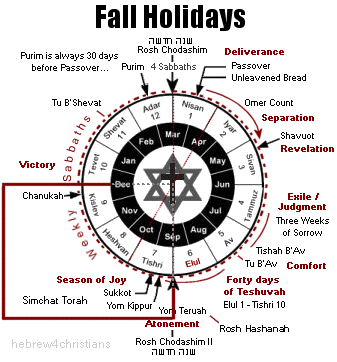|
Jewish Holiday Calendar
Note: For November 2017 site updates, please scroll past this entry....
The Jewish civil year begins in the fall, though the Biblical year begins in spring (Exod. 12:2). Preparations for the fall holidays begin with a thirty day period of teshuvah (repentance) during the (late summer) month of Elul. The following ten days begin with the Feast of Trumpets (i.e., Rosh Hashanah, on Tishri 1) and end with the Day of Atonement (i.e., Yom Kippur, on Tishri 10). These first ten days of the new year are called the "Ten Days of Awe" (i.e., aseret ye'mei teshuvah: עֲשֶׁרֶת יְמֵי תְּשׁוּבָה), or simply the Jewish "High Holidays." Just five days after the solemn time of Yom Kippur begins the joyous week-long festival of Sukkot ("Tabernacles"), which is immediately followed by the celebration of Simchat Torah. The holiday of Chanukah occurs in late fall and carries over to the winter season:
The Fall Holidays:

The fall festivals prophetically indicate the Day of the LORD, the second coming of Yeshua, the great national turning of the Jewish people, and the establishment of the reign of the Messiah upon the earth during the Millennial Kingdom in the world to come.
Note that in accordance with tradition, holiday dates begin at sundown. Moreover, some holidays may be postponed one day if they happen to fall on the weekly Sabbath:
- Month of Elul (Mon., Aug. 21st [eve] - Wed. Sept. 20th [day])
- Month of Tishri (Wed. Sept. 20th [eve]) - Thur. Oct. 19th [day]
- Rosh Hashanah / Yom Teru'ah - Tishri 1 5778 (Wed. Sept. 20th) - Seder
- The Ten Days of Teshuvah: Wed. Sept 20th - Fri. Sept. 29th
- Shabbat Shuvah - the Shabbat that occurs during the Ten Days of Repentance between Rosh Hashanah and Yom Kippur (Fri., Sept. 22)
- Tzom Gedaliah - Sun. Sept. 24 (sunrise to sunset fast)
- Yom Kippur - Fri. Sept. 29th, a Sabbath (the fast begins an hour before sunset and runs 25 hours until after sunset Sat. Sept. 30th).
- Sukkot - Wed. Oct 4th at sundown through Wed. Oct. 11th at sundown.
- Hoshana Rabba - Climactic last day of Sukkot, Wed. Oct. 11th.
- Shemini Atzeret - The "eighth day" assembly after Sukkot. Thurs. Oct 12th.
- Simchat Torah - Celebration of the conclusion of the completion of the yearly Torah Reading Cycle. Thurs. Oct 12th - Friday Oct. 13th.
- Shabbat Bereshit - The beginning of the Torah Reading Cycle for the new year (Friday, Oct. 13th after sundown through the following Sabbath day).
- Month of Cheshvan (Thur. Oct. 19th [eve] - Sat. Nov. 18th [day])
- Five Sabbaths: Noach, Lekh-Lekha, Vayera, Chayei Sarah, Toldot
- Yom HaAliyah - a modern holiday established to acknowledge the contibution of olim (Jewish immigrants) to the Jewish state (Thur. Oct 26th; Cheshvan 7).
- Sigd - 50th day after Yom Kippur; Ethiopian Jewish holiday (Fri., Nov. 17th)
- Month of Kislev Sat. Nov. 18th [eve] - Sun. Dec. 17th [day])
- Four Sabbaths: Vayetzei, Vayishlach, Vayeshev, Miketz
- Dates for Chanukah 2017 (5778):
- 1st Chanukah candle - Tues. Dec. 12th [i.e., Kislev 25]
- 2nd Chanukah candle - Wed. Dec. 13th
- 3rd Chanukah candle: Thur. Dec. 14th
- 4th Chanukah candle: Fri. Dec. 15th
- 5th Chanukah candle: Sat. Dec. 16th
- Month of Tevet (Sun., Dec. 17th [eve] - Tues. Jan. 16th [day])
- Four Sabbaths: Vayigash, Vayechi, Shemot, Vaera
- Dates for Chanukah (continued):
- 6th Chanukah candle: Sun. Dec. 17th (Rosh Chodesh Chanukah)
- 7th Chanukah candle: Mon. Dec. 18th
- 8th Chanukah candle: Tues. Dec. 19th [Zot Chanukah]
- Winter Solstice: Wed. Dec. 20th (Kislev 20)
- Christmas: Sunday, Dec. 24th at sundown (Tevet 7)
- Tenth of Tevet - Thur. Dec. 28th; daytime fast over the seige of Jerusalem
- Secular New Year: Sun. Dec. 31st, 2018 (Tevet 14)
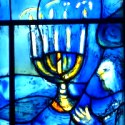 |
Note: Some calendars will list the first day of a holiday without indicating that the holiday actually begins sundown the night before... So, for example, while Chanukah begins Tuesday, Dec. 12th at sundown, some calendars may indicate that it occurs on the following day...
November 2017 Updates
Note: If any page content appears to be missing, please refresh the page...
Our Father, Our King...

11.30.17 (Kislev 12, 5778) "Blessed are you, O LORD God of Israel our Father, forever and ever. Yours, O LORD, is the greatness and the power and the beauty and the victory and the majesty, for all that is in the heaven and in the earth is yours. Yours is the kingdom, O LORD, and you are exalted as head above all" (1 Chron. 29:10-11). Amen, amen. In light of this blessed truth, then, what is it but unbelief that incites us to fear, to become anxious, frustrated, angry, and to seek to control outcomes? Forgive us, O Lord: We sometimes fail to remember your greatness; we lose sight that you indeed reign over all; our fears moves us into exile, our hearts grieve when we find ourselves immersed in the vanity of this world... But "all that is in heaven and earth is thine" (כּל בַּשָּׁמַיִם וּבָאָרֶץ לְךָ), and therefore everything is under your ongoing supervision... You sustain and uphold all things by the Word of your Power (נוֹשֵׂא כל בִּדְבַר גְּבוּרָתוֹ); you are our good Shepherd, our loving Father; you watch over our ways; you write our names upon your hands; you show us the path of life (Psalm 16:11). "You are strength and might, and it is in Your power to make anyone great and strong," and therefore help us, O Lord, to revere you; help us to know that nothing is trivial; awaken us to the truth of your Reality and Presence... Teach us to number our days that we might become wise (Psalm 90:12); we are as a breath; our days are like a passing shadow (Psalm 144:4); have mercy upon us and redeem the days appointed for our sojourn.
לְךָ יְהוָה הַגְּדֻלָּה וְהַגְּבוּרָה וְהַתִּפְאֶרֶת
וְהַנֵּצַח וְהַהוֹד כִּי־כל בַּשָּׁמַיִם וּבָאָרֶץ
לְךָ יְהוָה הַמַּמְלָכָה וְהַמִּתְנַשֵּׂא לְכל לְראשׁ
le·kha · Adonai · ha·ge·dul·lah · ve'ha·ge·vu·rah · ve'ha·tif·e·ret
ve'han·netz·ach · ve'ha·hod · ki·khol · ba·sha·ma·yim · u'va·a·retz
le·kha · Adonai · ha·mam·la·khah · ve·ham·mit·nas·seh · le·khol · le·rosh

"Yours, O LORD, is the greatness and the power and the beauty
and the victory and the majesty, for all that is in the heaven and in the earth is yours.
Yours is the kingdom, O LORD, and you are exalted as head above all."
(1 Chron. 29:11)

Download Study Card
A Holy Desperation...
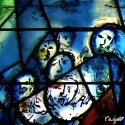
11.30.17 (Kislev 12, 5778) Do you have the "gift of holy desperation"? That's the special blessing of needing God so viscerally that you otherwise will fall apart or self-destruct apart from His daily intervention in your life... Do you sense your need for deliverance "in the kishkes," that is, in your gut? Do you pray because your very life depends on it? The Torah says that the fire on the altar was to be kept burning at all times (Lev. 6:12-13), which symbolizes esh tamid (אֵשׁ תָּמִיד), or the inner fire of the heart... How blessed it is to be full of the fire of this inner need, this relentless groaning, this constant hunger to be set free: As Job yearned: "All the days of my warfare I hope, until my change will come" (Job 14:14).
What shall we do? In many ways we offend others. We are damaged, wounded, and much within us awaits healing. So we turn to God again and again, up to 70 x 70 times, if necessary, and keep seeking, despite ourselves. We learn to "endure ourselves" and tolerate our own imperfections, forgiving ourselves, for as long as we pretend that we are not subject to the faults common to others, we are liable to be controlled by them.
Fighting for Yourself...

[ The following entry is related to this week's Torah reading, parashat Vayishlach... ]
11.30.17 (Kislev 12, 5778) In our Torah portion for this week (i.e., parashat Vayishlach), we read how Jacob wrestled with a mysterious "Man" until the break of dawn, but refused to let go until he had secured God's blessing (Gen. 32:24-26). This climactic moment marked a "rebirth" experience for Jacob as signified by his new name "Israel" (יִשְׂרָאֵל), meaning "one who has striven (שָׂרָה) with God (אֱלהִים) and prevailed" (Gen. 32:28). It is fascinating to notice that Jacob was not renamed "God-fearer," or "God-lover," or even "Man of faith," but rather "God-wrestler" – one who struggles with God until the blessing comes... As Yeshua said, "Blessed are those who hunger and thirst for righteousness" – that is, for those who struggle and search for truth – "for they shall be filled" (Matt. 5:6). The blessing comes with a wound, however: The limp that Jacob acquired constantly reminded him of his ongoing need for God's help as he walked through this life. "The one who falls on this Stone will be broken to pieces; but when it falls on anyone, it will crush him" (Matt. 21:44).
"If I am not for myself, then who will be for me?" (Avot 1:14). So how are you struggling? How does that feed your hunger for God? The characteristically Jewish approach to life is to struggle, to fight, and to ask hard questions until we find out who we really are and what we call ourselves... We can change what has happened in our past by changing what is happening in our present: "For thus says the LORD to the house of Israel: dirshuni vichyu (דִּרְשׁוּנִי וִחְיוּ) - "Seek me and live" (Amos 5:4).
 |
Called by Name...

11.29.17 (Kislev 11, 5778) The Spirit speaks to the listening heart of faith: "Fear not, for I have redeemed you; I have called you by name, and you are mine" (Isa. 43:1). God has personally redeemed you, friend; He calls you by name, and you belong to Him. The Lord loves you with an everlasting love and draws you close (Jer. 31:3; John 6:44). He will never leave nor forsake you, even if you might face waters that seem to overwhelm or fires that seem to devour (Isa. 43:2). The will of your Heavenly Father will never lead you to a place where his love will not there sustain you...
אַל־תִּירָא כִּי גְאַלְתִּיךָ
קָרָאתִי בְשִׁמְךָ לִי־אָתָּהָ
al-ti·ra · ki · ge·al·ti·kha
ka·ra·ti · ve·shim·kha · li-at·tah

"Fear not, for I have redeemed you;
I have called you by name, you are mine" (Isa. 43:1)

Walking with God isn't just a matter of "head education," but also of "heart education," and these two must always go together as Spirit and Truth (John 4:23). Head education seeks knowledge primarily as a means of defining what you believe; heart education, on the other hand, centers on fear, or rather, on overcoming your fear by trusting in God's love and healing grace. When you accept that you are accepted despite yourself, you are delivered from the need to defend yourself. You can let go, quit denying who you are, and accept God's unconditional care for your life – regardless of the state of the world. When your heart learns to "be still," you can know that the God of Israel reigns over all things!
Raised from the Dust...
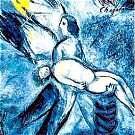
[ The following entry is related to this week's Torah reading, parashat Vayishlach... ]
11.29.17 (Kislev 11, 5778) In his heartfelt appeal to God for help, Jacob prayed: "I have been diminished (קָטנְתִּי) by all the kindness and all the truth you have done for your servant" (Gen. 32:10). Jacob was "made small" through the revelation of God's love and truth, and the focus therefore shifted away from himself to God: "He must increase, but I must decrease" (John 3:30). Jacob's subsequent wrestling with the Angel pictured birth pangs, the throes of his spiritual rebirth. Rashi notes that the word translated "wrestled" (i.e., va'ye'avak: וַיֵּאָבֵק, Gen. 32:24) is related to the idea of "raising the dust" (i.e., avak: אָבָק), which suggests resurrection from the dust. The struggle – the "death match" – was to bury the old Jacob and to raise him up as "Israel," a prince of God the King.
קָטנְתִּי מִכּל הַחֲסָדִים וּמִכָּל־הָאֱמֶת
אֲשֶׁר עָשִׂיתָ אֶת־עַבְדֶּךָ
ke·ton·ti · mi·kol · ha·cha·sa·dim · u·mi·kol · ha·e·met
a·sher · a·si·ta · et-av·de·kha

"I am not worthy of the least of all the deeds of love and faithfulness
that you have done for your servant."
(Gen. 32:10)
Yeshua told us we must "forget ourselves" in order to discover what really matters: "If anyone would come after me, let him deny himself and take up his cross and follow me. For whoever would save his life will lose it, but whoever loses his life for my sake will find it" (Matt. 16:24-25). Note that the phrase translated "deny himself" comes from a Greek verb (ἀπαρνέομαι) that means "to affirm that you have no acquaintance or connection with someone," and is the same verb used when Peter denied the Messiah (from α-, "not," + ῥέω, "to speak"). To deny yourself, then, means to be willing to disregard your own personal interests in a given moment -- to "betray" the selfish impulse that seeks to rule the ego in your daily life. It is a "putting off" of the old nature and a "putting on" of the new (Eph. 4:22-24). Put positively, denying yourself means "forgetting yourself" because you are overwhelmed with God's great love for your soul, and therefore you no longer "know yourself" according to the flesh but according to the Spirit of God (2 Cor. 5:16-17).
The Torah of Wrestling...

11.28.17 (Kislev 10, 5778) Yeshua somberly warned those who professed faith: "Not everyone who says to me, 'Lord, Lord,' will enter the kingdom of heaven, but the one who does the will of my Father who is in heaven. On that day many will say to me, 'Lord, Lord, did we not prophesy in your name, and cast out demons in your name, and do many mighty works in your name?' And then will I declare to them, 'I never knew you; depart from me, you workers of lawlessness'" (Matt. 7:21-23). Please note that despite the practice and profession of their faith, these people were strangers to God... They had a false sense of assurance, believing that they were "serving God" while they really were not... So the essential question here is whether Yeshua truly knows you. You may know a lot about God, religion, spirituality, and yet you may remain unknown by him... So where do you find life? What are you loving? Where are you going?
"Not everyone who says to me, 'Lord, Lord,' will enter the kingdom of heaven, but the one who does the will of my Father who is in heaven" (Matt. 7:21). Yet what is the will of the Father but to trust in Messiah for life (John 6:40)? "What must we do, to be doing the works of God?" Yeshua answers: "This is the work of God, that you believe in the One whom he has sent" (John 6:28-29). The Torah of God centers on trusting the Messiah (Titus 3:5-7).
On that day many will say to me, 'Lord, Lord, did we not ... do many mighty works in your name?' And then will I say to them, 'I never knew you; depart from me, you workers of lawlessness' (Matt. 7:22-23). From this we see that good works - even those done in the name of Messiah - are insufficient for life, and that something more is needed... That "something more" is the reality of relationship with him. However, even Yeshua's sacrifice on the cross can't bring you into relationship with him apart from receiving it for your healing... By faith you encounter Yeshua clothed in your flesh, your sin, and suffering death for you. "As long as Christ remains outside of us we are separated from him."
Some people feel frightened when they consider all this, but fear arises only if we miss Yeshua's point... Good works can't save you, even those performed in the Savior's name... What saves you is trusting in God's great love for your life: "This is the work of God, to trust in the One whom God has sent [for you]" (John 6:28-29). Genuine salvation is "from the LORD," that is, comes as a result of his loving intervention on your behalf (Titus 3:5-7; Eph. 2:8-10). This is the will of the Father, the true Torah of the LORD, namely, to honor the Messiah and know him by faith... You trust him for eternal life, you believe that he bears your sins, you seek to know his heart, and you desire to share your life with him. It is lawlessness to reject the Torah of the LORD that commands us to follow Messiah and know him in all our ways - including the ways of our struggles, our fears, and so on... Each of us must wrestle alone, in the dark places of fear, to find our new name from God (Gen. 32:24). Is the blessing for you or not? The essential thing is to know (and more importantly) to be known by Yeshua.... It is a matter of trust, of sharing your heart, being real with him, walking with him, loving him... "This is the work of God, to trust in the One whom God has sent [for you]." Trusting in the Lord means accepting that you are truly loved (and made safe) because of who God is...
The gospel is "the power of God for salvation to everyone who believes, to the Jew first and also to the Greek" (Rom. 1:16). It is a miracle of being in a right relationship with God. We are pursued by his love, and he haunts us until we surrender to his will... Like Jonah we first must be "swallowed up" in consciousness of our own rebellion before we realize we are undone, that we are without remedy apart from God's intervention and deliverance. We start there - in the "belly of the fish" - and later are resurrected to go forth by God's mercy and grace. As we look to Yeshua, as we lean on him, he reveals more of himself to us. He gives us the grace and strength we need; he is always enough...
Whether Yeshua is living in you (and you are living in Him) is the most important question of your life upon which everything else turns. The great mystery is "Christ in you, the hope of glory" (Col. 1:27). As Ravenhill once said, "I don't ask people if they're saved anymore; I look them straight in the eye and say, "Does Christ live inside you?" Indeed, He is present right now -- for you -- in this very moment... Are you connected with Him in the truth? Are you drawing life from His life? Do you really live in Yeshua? "God is making his appeal through us. We implore you on behalf of Messiah, be reconciled to God" (2 Cor. 5:20).
Each of us must wrestle alone, in the dark places of fear, to receive our new name from God (see Gen. 32:24). Again I ask: Is the blessing for you or not? Are you willing to be loved and accepted by him? What is your name? What do you call yourself? You cannot know God apart from his love, yet for some people that is exactly where the struggle lies... Look within your heart; test yourself; do you believe God cares for you? Take hold of the promise and do not let go until you know who you are in his love. "To the one who conquers I will give some of the hidden manna, and I will give him a white stone, with a new name written on the stone that no one knows except the one who receives it" (Rev. 2:17).
Repeat these affirmations of faith:
The blessing is there for you, though you might need to wrestle in faith to fully take hold of your identity in Christ. May God help you answer to the new name he calls out to you...
בָּרוּךְ הוּא הָאֱלהִים אֲבִי אֲדנֵינוּ יֵשׁוּעַ הַמָּשִׁיחַ
אֲשֶׁר בֵּרַךְ אתָנוּ מִשְּׁמֵי מְעוֹנוֹ
בְּכָל־בִּרְכַּת הָרוּחַ בַּמָּשִׁיחַ
ba·rukh · hu · ha·e·lo·him · av·i · a·do·nei·nu · Yeshua · ha·ma·shi·ach
a·sher · be·rakh · o·ta·nu · mi·she·mei · me·o·no
be·khol · bir·kat · ha·ru·ach · ba·ma·shi·ach

"Blessed be Adonai, Father of our Lord Yeshua the Messiah,
who has blessed us in heavenly places
with every spiritual blessing in the Messiah." (Eph. 1:3)

Download Study Card
Listen to this message:
Reconciliation and Atonement...

[ The following entry is related to this week's Torah reading, parashat Vayishlach... ]
11.28.17 (Kislev 10, 5778) When he was younger, Jacob was willing to deceive his own father and to "grapple" the advantage from his brother, but his long exile marked a time of teshuvah that enabled him to come to terms with his past... Jacob consequently became a broken man who understood that he was entirely unworthy to receive God's blessing: "I am not worthy of the least of all the deeds of steadfast love (chesed) and all the faithfulness (emet) that you have shown to your servant, for with only my staff I crossed this Jordan, and now I have become two camps" (Gen. 32:10). In a Torah scroll, the Hebrew word katonti (קָטנְתִּי), translated as "I am unworthy," is written with a diminished Tet (ט) to indicate the humility of Jacob. Indeed Jacob no longer felt "entitled" to receive God's blessing but was diminished or "made small" (קָטָן) before the unmerited kindness of God. At this point Jacob began addressing his prayer to the LORD (יהוה) rather than to God (אֱלהִים), indicating that he now sought the compassion of God instead of God's justice....
Note: For more on this subject, see the article "Reconciliation and Atonement."
Seeking God's Face...

11.27.17 (Kislev 9, 5778) From our Torah portion this week (Vayishlach) we read: "And Jacob called the name of the place "the Face of God" (i.e., Peniel: פְּנִיאֵל) saying, "For I have seen God face to face (פּנִים אֶל־פָּנִים), and yet my life has been delivered" (Gen. 32:30). And where did Jacob see God "face to face" except in the struggle of faith, while seeking the blessing, even in the midst of his own inner conflict? And here too may we find the Shining Presence, the Face of God, even in the midst of our troubled lives, as we struggle, refusing to let go until we are taken hold by God's love...
"And Jacob called the name of the place 'Peniel,' translated "the Face of God." The "name of the place" (שֵׁם הַמָּקוֹם) here refers to the heart, the inner sanctuary, which is called the place of God. Where it says, "let them make me a Sanctuary, that I may dwell in their midst" (Exod. 25:8), the text literally reads, let them make me a sanctuary, that I may dwell within them (בְּתוֹכָם), that is, within their hearts. The place (or ha'makom) is therefore the holy ground of the heart; the place within where God's face is disclosed, and where we can apprehend God. It is noteworthy that the Hebrew word for "face," i.e, panim (פָּנִים), is written the same way as the word for "inside," that is, penim (פְּנִים). Indeed the word face comes from a root word panah (פָּנָה) meaning "to turn" (the Hebrew preposition "before," i.e., lifnei (לִפְנֵי) comes from the same root and literally means turning toward or facing something). We can come to "the place of God" when we turn our hearts in respect before what is real and true. "Respect precedes Torah," which means we cannot even begin to experience the Divine Presence apart from honoring the sacred, distinguishing it from the common, and understanding that we owe every fiber of our existence to the One before whom we shall give account (Heb. 4:13). The Spirit promises: "You will seek me and find me, when you seek me bekhol levavkha - with all your heart - and I will be found by you, declares the LORD" (Jer. 29:13).
Telling God your name...

[ The following entry is related to this week's Torah reading, parashat Vayishlach. Note that I made an audio version of this topic that you can listen to (or download) below. ]
11.27.17 (Kislev 9, 5778) Some people make it the business of theology to know God's Name, but God begins by first asking for our name instead. Recall that Jacob had disguised who he really was in the hope of obtaining the blessing (Gen. 27), though his duplicity forced him into an exile that lasted until he was finally willing to be honest with himself. And like Jacob, each of us must answer God's question: Mah shimkha? "What is your name?" (Gen. 32:27). When we "wrestle through" this question to face who we really are, we encounter God and find our blessing, that is, our true identity. Each of us has to go through the process of being renamed from "manipulator" (i.e., Yaakov) to "one in whom God rules" (i.e., Israel). But note the order: it is only when we "tell God our name," that is, own who we really are, that He meets with us "face to face" (Gen. 32:30). You will not be able to say, "I will not let you go unless you bless me," until you are willing tell God your name (Gen. 32:26-27).
Let me add that while "telling God your name" can be painful and even frightening, it is not the last word about who you really are. We are faced with an inner dualism as we struggle to take account of our lives. On the one hand, we need to confess the truth of our sinfulness, brokenness, and so on, while on the other we must endure ourselves and find faith that God's blessing nevertheless belongs to us, despite the mess we've made of our lives.... We have to be willing to accept God's new name for us and to believe that God will miraculously transform our inner nature for good. We are renamed from Yaakov to Israel, though we still know ourselves as both. Jacob was renamed "Israel" but afterward he walked with a limp, seeing both the new and the old natures within him. Jacob still struggled, though his struggle was now focused on walking as God's beloved child in this world: the limp was given to help him lean on the Lord for support.
Some people may need help learning to "endure themselves." Many are able, it seems, to receive the hope that they are forgiven for their past sins, but they are subsequently scandalized by encountering their own inner struggles, and they eventually despair over their ongoing weakness... Tragically, some are even tempted to regard the warfare within the heart as a sign of being devoid of all saving grace! We must remember, however, that there is a real struggle between the desires of the flesh and the desires of the Spirit (Gal. 5:17). We must never move away from simple trust in the message of God's unconditional love demonstrated at the cross; we must never seek to legitimize our place in God's heart. When we walk by the Spirit, we are no longer under the law (Gal. 5:18), which is to say, we no longer need to justify ourselves but instead trust in God's power to transform us. Just as we are saved by the love of God, so are we changed, so do we grow....
Jacob's Surrender...
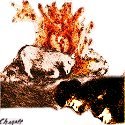
[ The following entry is related to this week's Torah reading, parashat Vayishlach... ]
11.26.17 (Kislev 8, 5778) Our Torah portion this week tells the story of how Jacob fled from the land of Haran to return home, but this forced him to directly face the pain of his past. Jacob was especially anxious about seeing his aggrieved brother again, and therefore he prayed to God in humility for deliverance (Gen. 32:9-11). He then sent messengers ahead with gifts for Esau, and when he finally approached him, Jacob humbly bowed down seven times in deep respect. The sages comment that Jacob realized the only hope he had of protecting himself and his family was to diminish himself... His long-standing battle with Esau had really been an inner struggle with his own ego - his own insatiable desire to be first, to secure his father's favor, and so on. Because of this, Jacob realized he could only find peace with his brother if he first found peace within himself, and therefore he let go of his need to be first and surrendered himself. Paradoxically, we must descend in order to ascend, and the "the way up is the way down." As Yeshua said, "The first shall be last and the last shall be first," and "Whoever would be first among you must be slave of all" (Mark 9:35; 10:44). Becoming "nothing" (i.e., ayin) in this world is the condition for life in the world to come (Gal. 6:3). When you are "not there," you are no longer under the influence of the ego, and therefore you are set free to be yourself and to serve God (Col. 3:1-3).
Now this is not pious talk that is ideal but practically unattainable; no, we are enabled to extinguish the demands of the ego by trusting in the miracle of God, not by trying to efface ourselves... Surrender is not another venture of the ego. Life in the Spirit means trusting that God will do for you what you cannot do for yourself... We can only take hold of what God has done for us by "letting go" of our own devices (Phil. 2:13). When we really let go and trust, we will be lifted up by the "Torah of the Spirit of life" (Rom. 8:2). The way is not trying but trusting; not struggling but resting; not of clinging to life, but of letting go...
Parashat Vayishlach...

[ We always read Vayishlach a couple weeks before Chanukah when we connect the vision and ministry of Joseph with that of Yeshua, the Suffering Servant Savior of the world... ]
11.26.17 (Kislev 8, 5778) Our Torah portion this week (i.e., parashat Vayishlach) contains the famous account of how Jacob "wrestled" with the Angel of the LORD (מַלְאַךְ יְהוָה) just before he encountered his estranged brother Esau. During the "grappling" session (recall the meaning of Jacob's name), the Angel injured Jacob's thigh, but Jacob refused to release his hold until he received the blessing (הַבְּרָכָה). The LORD then asked him, "What is your name (מַה־שְּׁמֶךָ)?" And he said, "Jacob" (i.e., Ya'akov: יַעֲקב). The Angel then replied, "Your name shall no longer be Ya'akov ("heel holder" [of Esau]) but Yisrael ("contender with God"), for as a prince (i.e., sar: שַׂר) you have contended (i.e., sarita: שָׂרִיתָ) with God and with men and have prevailed" (Gen. 32:28). This teaches that Jacob finally received the blessing when he refused to let his past determine his spiritual identity and destiny. With God's help he overcame the pain and shame of his past through faith.
Likewise each of us must "go to Peniel" to wrestle with the Angel, just as each of us must be renamed from Ya'akov ("a supplanter") to Israel ("a prince with God"). When the Spirit of Truth asks, "What is your name," may the LORD God grant you the courage to refuse to "let go" until you receive the divine blessing of love and acceptance...
The word vayishlach (וַיִּשְׁלַח) means "and he sent" (from shalach, שׁלח, "to send"). The sages comment that like Jacob, each person of faith is a shaliach (שָׁלִיחַ), or an "emissary" sent out to bear witness to others of the reality and true blessing of God. And may the LORD God of Israel help you, friend, serve as an extension (שְׁלוּחָה) of His loving and gracious Presence to all you may encounter this day.... L'shavuah tov b'Yeshua adoneinu, chaverim...
Torah of Faith, Hope, Love...

11.24.17 (Kislev 6, 5778) Regarding Abraham it is written: "And he believed the LORD, and he counted it to him as righteousness" (Gen. 15:6). Here note the distinction between the promise of God and the commandments of God. The promise of God focuses on God's heart - his desire and goal, his character and passion - but the commandments of God focus on man's heart, in his desire and will to obey (or not). Receiving God's love is not based on imperative and the language of conditional acceptance, but is based on the invitation and promise of love and grace. The "work of faith" (מַעֲשֶׂה הָאֱמוּנָה) is to believe that God accepts you despite your unacceptability, and that you are esteemed righteous for believing the truth of God's heart. Faith justifies the ungodly because faith accepts the promise, just as Abraham was justified because he trusted in the promise of the seed to come. Therefore, as Rabbi Paul taught, we maintain that a person is justified apart from the law (Rom. 3:28), which is to affirm that eternal life is found exclusively in the grace and promises of God. This is the Torah of "faith, hope, and love," and it is a lifelong discipline to know it in the truth. "Blessed are those who hunger and thirst for God's righteousness, for they shall be satisfied" (Matt. 5:6).
Thank you all for remembering the Hebrew for Christians ministry in your prayers, friends... Though we have been severely tested over the last few weeks, the LORD has kept us going. Shabbat Shalom and may you be filled with God's faith, hope, and love.
Beware of False Prophets...
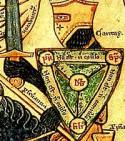
11.24.17 (Kislev 6, 5778) "Beware of false prophets," Yeshua warned, "who come to you in sheep's clothing (literally, "the skins of sheep," ἐν ἐνδύμασι προβάτων), but who inwardly are ravenous wolves. You will recognize them by their fruits" (Matt. 7:15; cp. 2 Pet. 2:1). However, because they come in disguise, pretending to be "children of light," we must be all the more vigilant. On the one hand, we must beware of those who "wrap themselves in a tallit" (legalists) and teach that we should come under the yoke of the law (Matt. 23:15), and on the other, we must beware those who minimize words of the holy Torah, who falsely claim that the way to heaven is "broad," and that we therefore are "free" to walk after the desires of our own hearts (antinomianists). We must use discernment, friends. Note this well, friends: God allows false teachers in our midst to test our hearts: "For there must be (δεῖ) factions among you so that those who are genuine among you may be recognized" (1 Cor. 11:19). Therefore "test the spirits" to see if they are "of God," that is, whether they focus on the righteousness of God given exclusively through Yeshua, the "narrow way that leads to life" - or whether they focus on something else. The Holy Spirit centers the heart on the glory of God revealed in Yeshua (John 16:14; 1 Cor. 2:2, etc.).
Broken and Remade...
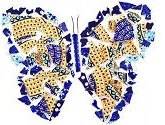
11.24.17 (Kislev 6, 5778) "See to it that no one fails to obtain the grace of God; that no root of bitterness springs up and causes trouble, and by it many become defiled; that no one is immoral or profane like Esau, who sold his birthright for a single meal. For you know that afterward, when he desired to inherit the blessing, he was rejected, for he found no chance to repent, though he sought it (the blessing) with tears" (Heb. 12:15-17; Gen. 27:38). "For my people have committed two evils: they have forsaken Me, the fountain of living waters (מְקוֹר מַיִם חַיִּים), and hewed out cisterns for themselves, broken cisterns that can hold no water" (Jer. 2:13). Spiritually speaking, there are two basic sorts of breaking. One is to be broken by the inevitable sin and ruin of this world, and the other is to be made lev-nishbar (לֵב־נִשְׁבָּר), a broken heart, before the LORD. The former breaking comes from the vain attempt to find life in the broken vessels of this world, and "repentance" is expressed as remorse over perceived temporal loss. This sorrow eventually leads the soul to death (2 Cor. 7:10). To be inwardly broken, on the other hand, requires mourning over your life and returning to God for deliverance (Matt. 5:4). In hunger and thirst for God's righteousness the soul finds eternal satisfaction, since God alone provides the vessel of "living water" we need to live (John 4:14; 7:38). We all must drink from God's fountain of life (מְקוֹר חַיִּים), lest we suffer spiritual dehydration and death....
Are you haunted by an inner ache for love, joy, peace, and life? "Blessed are those who hunger and thirst for righteousness, for they shall be satisfied" (Matt. 5:6). Our inner poverty and need is a disguised grace; our desire for healing reveals the Spirit's invitation. Faith begins with the recognition of our need, since only then will we come to Yeshua for the "Bread of Life" (לֶחֶם הַחַיִּים) and the "Living Water" (מַיִם חַיִּים). Everything we need is found in him, though we must reach out in faith: "For without faith (אֱמוּנָה) it is impossible to please him, for whoever would draw near to God must believe that he exists, and that he rewards those who seek him" (Heb. 11:6). God rewards those who seek him; he answers the heart's cry; he responds to all who trust in his love and salvation. Therefore "ask, and it will be given to you; seek, and you will find; knock, and it will be opened to you. For everyone who asks receives, and the one who seeks finds, and to the one who knocks it will be opened" (Matt. 7:7-8). We are not saved by faith in our own faith, but in the Reality and Power of the LORD God who alone can raise the dead to new life....
Gratitude and Seeing...
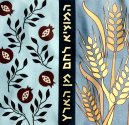
[ Happy Thanksgiving, friends. It is always good to thank God for the precious gift of life... ]
11.23.17 (Kislev 5, 5778) We read in the Torah: "And you shall bless the LORD your God for the good" (Deut. 8:10). Whenever we derive benefit or enjoyment from something we are to bless (i.e., thank) God for his goodness. Indeed the Hebrew term for gratitude is hakarat tovah (הַכָּרַת טוֹבָה), a phrase that means "recognizing the good." The heart looks through the eye, and therefore how we see is ultimately a spiritual decision: "If your eye is "single" (i.e., ἁπλοῦς, sincere, focused)," Yeshua said, "your whole body will be filled with light" (Matt. 6:22). When we see rightly, we are awakened to God's Presence in the little things of life, those small miracles and "signs and wonders" that constantly surround us. The good eye of faith sees hundreds of reasons to bless God for the precious gift of life (1 Cor. 10:31). Open your eyes... The LORD is "enthroned among the blessings of His people" (Psalm 22:3).
אַתָּה קָדוֹשׁ
יוֹשֵׁב תְּהִלּוֹת יִשְׂרָאֵל
ve·at·tah · ka·dosh · yo·shev · te·hil·lot · yis·ra·el

"You are holy,
enthroned on the praises of Israel."
(Psalm 22:3)

The thank offering mentioned in the Torah (i.e., zevach ha-todah: זֶבַח הַתּוֹדָד) reappears in the New Testament. In the Book of Hebrews were are instructed to "continually offer up a sacrifice of thanks (זֶבַח תּוֹדָה) to God, that is, the fruit of lips that acknowledge his Name" (Heb. 13:15). It is interesting to note that the Greek verb used to "offer up" (i.e., ἀναφέρω) is used to translate the Hebrew verb "to draw near" (karov) in Leviticus. In other words, the "offering up of thanks" for the sacrifice of Yeshua functions as "korban" and draws us near to God. Thanking God for personal deliverance constitutes "right sacrifices" (זִבְחֵי־צֶדֶק) as we draw near to God in the hope of His love (Psalm 4:5; Heb. 7:19).
"Give thanks to the LORD for He is good; his love endures forever" (Psalm 136:1); "give thanks to the LORD always" (Col. 3:17; Eph. 5:20; 1 Thess. 5:18)... Gratitude is foundational to our lives as followers of Yeshua. Indeed there are really only two prayers we ever offer to God, namely "Help, LORD!" and "Thank you, LORD." Meister Eckhart once remarked that if the only prayer you said in your entire life was, "thank you," that would suffice... Genuine prayer ultimately resolves to an expression of thanks. We are to "praise the Bridge that carries us over" into the Presence and Love of God, and that Bridge is Yeshua our Lord.
Gratitude and Spirituality....
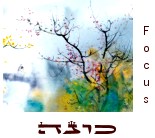
11.23.17 (Kislev 5, 5778) Expressing gratitude is a core value of genuine spirituality. "Modei ani," I thank you, God... Being thankful indicates that you are trusting that God is working all things together for your good, and it confesses that all you are is a gift from heaven. Indeed, the Hebrew word todah (תּוֹדָה), usually translated "thanks," can mean both "confession" and "praise." The matriarch Leah used a play on words regarding the birth of her fourth son (Gen. 29:35) when she said she would thank the LORD (אוֹדֶה אֶת־יהוה), and therefore she named him "Judah" (יְהוּדָה), from which the word "Jew" was later derived. The Apostle Paul, the greatest of the Torah sages, alluded to this when he said that a true Jew (יְהוּדִי) is one inwardly (κρυπτός), whose circumcision is a matter of spirit, not of the flesh. A genuine Jew gives thanks to God for who He is and what He has done; his desire is not for the approval of men, but of God (Rom. 2:28-29).
הוֹדוּ לַיהוָה כִּי־טוֹב
כִּי לְעוֹלָם חַסְדּוֹ
ho·du La·do·nai ki tov ki le·o·lam chas·do

"Give thanks to the LORD, for he is good,
for his loyal love endures forever."
(Psalm 136:1)

Hebrew Study Card
Transformed by Love...

11.22.17 (Kislev 4, 5778) How do we change? How are we made new? Is it through self-effort? making resolutions? changing our diet or wardrobe? going into counselling? joining a "religion"? Or do we change by the miracle of God's compassionate intervention in our lives? When Yeshua invites us to turn and come to Him, he wants us to awaken to something so valuable that we would be willing to give up everything in the world to take hold of it (Matt. 13:45-46). True spiritual transformation is not just about leaving your sin behind you (as good as that is), but is rather about discovering the glory of true and infinite life. It's about being the beloved. May the Lord help us see...
God's love sees the hidden beauty, worth, and value of your life. "Again, the kingdom of heaven is like a merchant in search of fine pearls, who, on finding one pearl of great value, went and sold all that he had and bought it" (Matt. 13:45-46). You may be tempted to identify with the merchant and regard this parable as a challenge to give up everything to obtain the surpassing worth of the kingdom of heaven, but another way to understand it is to see God as the Merchant, the central character of the story.... Instead of you paying the great price for the pearl, turn the story around: God pays the price - and you are regarded as His choice pearl! You are a treasured possession, the "apple of God's eye..."
We are changed by the power of unconditional love, but this means that we must allow ourselves to be loved without attempting to earn it (Rom. 4). If we are willing to receive love only if we regard ourselves as worthy or deserving of it, then we will reinforce the illusion that love can be bought, explained, or owed to us based on our merit.
Have you discovered the glory and wonder of God's unconditional love, despite the many sins and the shame of your life? Do you know "in your gut" that his love means no longer having to defend or explain yourself? God's love enables you to quit hiding what you really are from Him; you can give up the pretense of being something you're not. When you turn to the Lord in the transparency of your brokenness, weakness, and neediness, you will find Him there, accepting you for who you really are...
That's the message of gospel, after all. The cross of Yeshua is the end of "self improvement" projects, and that includes the "end of the law" as the means of attempting to find our acceptance before God (Rom. 10:4). We come to know God's love and acceptance "apart from the law," that is, despite our repeated failures, pain, and loss of the false self. We are truly changed as we disclose more and more of what we really are to God, that is, when we come "out of the shadows" to be made visible and healed before His glorious Presence. Then we discover the "lightness" of being united to the risen Messiah and the "law of the Spirit of life in Yeshua (תּוֹרַת רוּחַ הַחַיִּים בְּיֵשׁוּעַ). May God work within us all such a miracle!
Truth and Passion...

11.22.17 (Kislev 4, 5778) During the End of Days (אַחֲרִית הַיָּמִים) people will have a "form" (μόρφωσιν) of godliness but will deny its inner power, since their hearts will be turned away from the truth: "And because lawlessness (i.e., ἀνομία, lit. a=without; nomos=Torah) will be increased, the love of many will grow cold" (Matt. 24:12). In this connection we note that the Hebrew word for "falsehood" (or "lie") is sheker (שֶׁקֶר), which can also be read as she-kar (שֶׁקַר), meaning "that which" (-שׁ) makes you cold (קַר). The truth of God can't be known apart from His passion, inner fire, desire. Indeed, the Hebrew word for "sin" (חֵטְא) means "missing the mark," though that essentially means missing the revelation of God's glory because lesser fears deaden the heart and cool the passion for the truth... Let us ask the LORD to rekindle the fire within our hearts!
"Be still and know that I am..." Prayer is a type of listening (shema), a turning back to heed the message of God's love and hope in Messiah. Indeed, the word "teshuvah" (תְּשׁוּבָה), often translated as "repentance," also means an answer or response to a question. God's love is the question, and the heart's response is the answer. Some of us may find it difficult to trust, to open our heart to receive grace and kindness. For those of us wounded by abandonment, it can be a great struggle to hear the voice of God calling you "beloved," "worthy," "valued," and "accepted." When you find faith to receive God's word of love, however, your heart comes alive and you begin to heal...
The LORD your Guardian...

11.21.17 (Kislev 3, 5778) Where it says, "The LORD is your Guardian; the LORD is your shade at your right hand" (Psalm 121:5), note that God's Presence is likened to the shadow (צֵל) cast by someone who walks closely beside you, holding your hand (Psalm 23:4). Your "right hand" (יְמִינֶךָ) refers to your decision to "see the unseen" by performing acts of righteousness in this world: the blessing of God is then cast upon all you do (Deut. 2:7; Psalm 1:3). Neither does God "slumber or sleep," for the LORD your Guardian (יְהוָה שׁמְרֶךָ) is fully awake, full of life, insuperable power, and divine action! Our help comes from the LORD, "oseh shamayim va'aretz" (עשֵׂה שָׁמַיִם וָאָרֶץ) - the Maker of heaven and earth.
יְהוָה שׁמְרֶךָ
יְהוָה צִלְּךָ עַל־יַד יְמִינֶךָ
Adonai · shom·re·kha
Adonai · tzil·le·kha · al-yad · ye·mi·ne·kha

"The LORD is your Guardian;
the LORD is your shade on your right hand."
(Psalm 121:5)

Note: Some of the sages (e.g., Baal Shem Tov, Ramban, etc.) have said that "God is your shadow" (יְהוָה צִלְּךָ) suggests that he reflects your actions back to yourself. To one who acts with cruelty, God will show himself cruel; to one who shows compassion, God will show himself compassionate, and so on. Just as a person's shadow will follow his movements, so God will pursue the soul. This idea is of course derived from the Scriptures - "according to your faith be it done unto you" (Mark 9:29): "With the merciful you show yourself merciful; with the blameless man you show yourself blameless; with the pure you will show yourself pure; and with the perverse you will show yourself perverse" (Psalm 18:25-26). Moreover we are warned: "Do not be deceived: God is not mocked, for whatever one sows, that will he also reap" (Gal. 6:7). "Toward the scorners he is scornful, but to the humble he gives favor" (Prov. 3:34). Thankfully the "karma of reciprocity" may be overruled by God's grace, so that unmerited blessing is bestowed upon the trusting soul, despite his or her many sins (Hab. 2:4; Gal. 3:11): "He has not dealt with us according to our sins, nor repayed us according to our iniquities" (Psalm 103:10).
The Ladder of Truth...

11.21.17 (Kislev 3, 5778) The Hebrew idea of "truth" (i.e., emet: אֱמֶת) is richer than the factual description, since it contains moral implications and possibilities: what is true is also right, good, reliable (honest), beautiful, and sacred. The Hebrew word comes from a verb (aman) that means to "confirm" or establish, and the noun form (i.e, emunah: אֱמוּנָה, "faithfulness" or "trustworthiness") expresses the will to live by what is ratified, the "amen" of decision. The Hebrew concept is therefore existential: truth that is not lived is not truth. Speaking the truth (dibbur emet) and abhoring dishonesty are considered foundational to moral life, as it says: "Speak the truth (דַּבְּרוּ אֱמֶת) to one another; render true and perfect justice in your gates" (Zech. 8:16). Yeshua repeatedly said, "Amen, amen I say to you...." throughout his ministry to stress the reliability and certainty of God's truth (Matt. 5:18, 26, etc.). Indeed, Yeshua is called "the Amen, the faithful and true witness" (Rev. 3:14).
The ancient Greek word translated "truth" is aletheia (ἀλήθεια), a compound formed from an alpha prefix (α-) meaning "not," and lethei (λήθη), meaning "forgetfulness." Greek scholars say the word lethei itself derives from the verb lanthano (λανθάνω), which means "to be hidden," so the general idea is that a-letheia (i.e., truth) is non-concealment, non-hiddenness, or (put positively) revelation or disclosure. Thus the word of Yeshua - His message, logos (λόγος), revelation, and presence - is both "unforgettable" and "irrepressible." Yeshua is the Unforgettable One that is manifest as the express Word of God (דְּבַר הָאֱלהִים). He is the Light of the world (אוֹר הָעוֹלָם) who imparts the "light of life" (John 8:12). Though God's message can be supressed by evil and darkened thinking, the truth is regarded as self-evident and full of intuitive validation (see Rom. 1:18-21).
Note that the LXX (i.e., the ancient Greek translation of the Torah and OT otherwise known as the Septuagint) dates from the time of the philosopher Plato, though of course the Hebrew text dates back to the time of Moses (13th century BC) and even earlier. About 300 BC, "Theophrastus," a student of Aristotle, wrote of the Jews that 'being philosophers by race, they converse with each other about the Divine." Abraham, who dates from about 2,000 BC, was the first avowed monotheist who openly repudiated the polytheism and idolatry of ancient Ugaritic culture (Abraham long predates the rise of Hinduism and the animistic hymns of the Vedas and their priestly commentary found in the Upanishads by a thousand years). Similarly, both David and his son Solomon (10th century BC) wrote "existential" works of philosophy, predating the modern world by nearly 3,000 years...
Regarding Jacob's famous dream, the sages ask: "When is the man lower on the ladder higher than the man who is higher on the ladder? When the lower one is climbing up and other higher one is descending down..." Or as Kierkegaard put it, the way is "how." How you focus determines the direction you are taking. So where is your focus? Are you looking to God for help, for strength, and the ability to draw close to him, or are you looking to your own strength, direction, and will?
A Deeper Awakening...

11.21.17 (Kislev 3, 5778) From our Torah this week (parashat Vayetzei) we read: "Then Jacob awoke from his sleep and said, "Surely the LORD is in this place (אָכֵן יֵשׁ יְהוָה בַּמָּקוֹם הַזֶּה), yet I did not know it" (Gen. 28:16). This event marked a deeper awakening for Jacob as he discovered God's Presence even in his sleep, even while in exile, and even in his ignorance... Henceforth Jacob began to understand that the whole world is filled with God's glory (Isa. 6:3), and that Torah is centered on knowing Him in all our ways (Prov. 3:6).
בְּכָל־דְּרָכֶיךָ דָעֵהוּ
וְהוּא יְיַשֵּׁר ארְחתֶיךָ
be·khol · de·ra·khe·kha · da·ei·hu
ve·hu · ye·ya·sher · or·cho·te·kha

"In all your ways know Him
and he will make upright your paths."
(Prov. 3:6)

We see this when we consider that Jacob had been asleep but was suddenly jarred awake by revelation. He found himself in awe, sensing the presence of the gateway to heaven. The sages note the grammar here is emphatic, suggesting that Jacob said: "Surely the LORD is in this place -- but am I (וְאָנכִי)? I do not know! (לא יָדָעְתִּי). Jacob had awakened from his dream to realize that he had been dreaming his life away, living in a fantasy world. God is present in this place – but am I? Have I awakened to be present before God?
Jacob's Vision of Messiah...
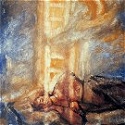
[ The following is related to this week's Torah reading, Parashat Vayetzei... ]
11.20.17 (Kislev 2, 5778) The revelation at Sinai and Jacob's vision of the ladder share something in common. Just as Yeshua was the "Voice of the Living God (קוֹל אֱלהִים חַיִּים) speaking (davar) from the midst of the fire" at Sinai (Deut. 5:26), so He was the Ascended LORD standing above the ladder speaking the word of promise (Gen. 28:12-15). In this connection we note that the words for "ladder," (i.e., sullam: סֻלָּם), "voice" (i.e., kol: קל), and "Sinai" (סִינָי) have the same numerical value, which suggests a connection between the two great visions. Yeshua is the Ladder to God, the means by which the Living Torah both descends and ascends for the sake of our deliverance (John 1:51). The "ladder of Sinai" is not meant for us to ascend but rather is for the LORD our Savior to descend and ascend on our behalf. This is always the way of the Righteousness of God rather than the religious aspiratoins of man... Yeshua is the way, the truth, and the life (הדֶּרֶךְ וְהָאֱמֶת וְהַחַיִּים): no one can draw near to the Heavenly Father apart from Him (John 14:6).
Note: For more on this subject, see "Jacob's Dream of Messiah."
Thank God for Grace...

11.20.17 (Kislev 2, 5778) "I do not nullify the grace of God, for if righteousness could come through the law, then Messiah died for nothing" (Gal. 2:21). Now while the law is holy, and the commandments are "holy, just and good" (Rom. 7:12), we cannot be justified by our own good works at the bar of divine judgment, and therefore we rely on God's grace – the promise that God justifies the helpless and the ungodly (see Rom. 4:5). Trying to justify yourself apart from the miracle throws away God's grace and regards Messiah's sacrifice as insufficient, and therefore is the greatest affront before heaven. Because Yeshua's death is essential, however, the law must be understood provisionally, or as a "tutor" that reveals our inner condition (Gal. 3:24). Recall that when the Ten Commandments were first uttered at Sinai, the people drew back in dread because the truth of their inner condition was exposed (Deut. 5:5-6). Paradoxically, the first great lesson of the law is that we are lawbreakers who are in lethal need for deliverance (1 Tim. 1:8-10). For this the miracle of regeneration is needed, as Yeshua clearly taught us (John 3:3-7). We do not find life apart from the Savior, the Way of Life, and therefore it is a grave mistake to regard Yeshua's ministry as a "second coming of Moses." No, Moses himself pointed to the coming of Messiah who would redeem Israel and make all things new (John 5:46; Luke 24:27; Gen. 22, etc.). Ironically, those who continue to establish their own righteousness by attempting to adhere to the law are regarded as slaves, the "children of Hagar," whereas those who trust in the promise of God are regarded as free, the "children of Sarah," inhabitants of Jerusalem that is above (see Gal. 4:21-5:1). The "works of the law," here understood to mean actions performed with the intent of commending the self before heaven, do not effect real righteousness, since Yeshua is the "end of the law" – the goal, purpose, and inner meaning – of eternal righteousness. Therefore Yeshua is Adonai Tzidkenu (יְהוָה צִדְקֵנוּ) – the LORD our Righteousness!
Note: The obedience of faith (ὑπακοὴν πίστεως), which Yeshua called the work of God (John 6:28-29), is the Torah "written upon the heart" so that we fulfill the heart of the law by means of the heart of God given to us... I am not advocating "anti-nomialism," or moral anarchy, of course: those who are truly people of faith walk in the law of God's love, which is the fulfillment or goal of the law (Rom. 13:10). People who think that we are set "free" from the law do not fully understand either what the law means nor what freedom means. The "work" of faith is real work, though it is the "work" of believing or trusting the promise of God, surrendering the heart to God's love, "accepting that you are accepted despite your unacceptability," and so on. The "work of faith" (מַעֲשֶׂה הָאֱמוּנָה) is the practice of receiving the blessing that you are a child of God by means of our Savior Yeshua's avodah for us... Yes, it's a balance to understand how the law and faith are related, though the power to obey the Shema (i.e., to love God in the truth) comes by receiving the promise of God's heart, not by adherence to a lawcode... The Torah is eternally true; the covenant is truly new.
Finding Inner Peace...

11.20.17 (Kislev 2, 5778) The ultimate question is whether you feel "safe" with the truth of who you really are... When you are all alone, in a moment of still silence, when the entire world is asleep and suspended, what is the message of your heart's cry? Are you okay? Do you trust who you are or what is happening to you, or do you experience anxiety, a sense of lostness, inner pain? Comfort is found in God's grace. His promise is given to the sick at heart, to those who understand their need for a physician (Matt. 9:12). Since there is nothing about you to commend before God, you are made free to abandon yourself to the divine love. This is the "Name of the LORD," after all, and your heart's cry for love is a "prayer" uttered in that Name. Your heavenly Father sees in secret (Matt. 6:6). Consider the birds of the air; they are unreflective, alive in the atmosphere of God's care. What a great blessing to let go of your fear; what sweet relief! Surrender to the truth of your helplessness; rejoice that you are "poor in spirit," and discover that yours is the Kingdom of Heaven (Matt. 5:3). So don't give up your faith, my friend. God promises to be with you to the end, leading you to the place where your heart will forever be satisfied in his love.
Parashat Vayetzei - וַיֵּצֵא

11.19.17 (Kislev 1, 5778) Our Torah portion for this week (Vayetzei) includes our father Jacob's dream of a ladder (סֻלָּם) extending from earth to heaven, with the angels of God ascending and descending, and the LORD Himself standing above assuring Jacob of his safe return to the land he had fled. Jacob awoke and responded to the dream with awe: "Surely the LORD is in this place (בַּמָּקוֹם הַזֶּה), and I did not know it." And he was afraid and said, "How awesome is this place! This is none other than the house of God, and this is the gate of heaven." And he called the name of that place Bethel (בֵּית־אֵל) i.e., "the house of God."
The sages interpret ha-makom (הַמָּקוֹם), literally "the place" that Jacob saw, as Mount Moriah, the exact location where Jacob's father Isaac was bound as the "sacrificed seed" and which later became the site of the Holy Temple. Indeed the word makom comes from a verb (קוּם) meaning "to arise," suggesting resurrection and ascension. In later Rabbinical thought Ha-Makom became synonymous with the Name or Presence of God Himself ("God is the place of the world, but the world is not God's only place").
Yeshua referred to Jacob's dream when he said, "Truly, truly, I say to you, you will see heaven opened, and the angels of God ascending and descending on the Son of Man" (John 1:51). Just as Jacob saw the ladder ascending to heaven with the angels of God ascending and descending upon it, so Yeshua told Nathanael that He was the Ladder to God, the sha'ar ha-shamayim (שַׁעַר הַשָּׁמָיִם) - the way into heaven (John 14:6). Indeed, Yeshua is the true Place or "house of God" and its Chief Cornerstone (Rosh Pinnah, Matt. 21:42). The LORD is the resurrection and life, the One who prepares a place for you (John 11:25; 14:2).
Thanksgiving Day and Sukkot...

[ Do you know about the Jewish roots of the American holiday of Thanksgiving, chaverim? ]
11.17.17 (Cheshvan 28, 5778) The American holiday of Thanksgiving (חַג הַהוֹדָיָה) undoubtedly has its roots in the Jewish tradition of giving thanks to God, and some historians believe that the early "pilgrims" actually derived the idea for the holiday from the Biblical festival of Sukkot (i.e., "the feast of Tabernacles"). Before fleeing to the "New World," the pilgrims lived for a decade among the Sephardic Jews in Holland, since Holland was considered a safe haven from religious persecution at the time. Since the pilgrims were devout Calvinists and Puritans, their religious idealism led them to regard themselves as "new Israel," and it is likely that they learned that Sukkot commemorated the people of Israel's deliverance from their religious persecution in ancient Egypt at that time. After they emigrated to the "Promised Land" of America, it is not surprising that these pilgrims may have chosen the festival of Sukkot as the paradigm for their own celebration. As the Torah commands: "Celebrate the feast so that your generations may know that I made the people of Israel dwell in booths when I brought them out of the land of Egypt: I am the LORD your God" (Lev. 23:39-43). The highly devout pilgrims regarded their perilous journey to the new world as a type of "Exodus event" and therefore sought the appropriate Biblical holiday to commemorate their safe arrival in a land full of new promise...
It is interesting to note that the Hebrew word for "turkey" is tarnegol hodu (תַּרְנְגוֹל הוֹדו), literally, "Indian chicken," which is often shortened to hodu (הוֹדוּ). It is a happy coincidence that we customarily eat turkey on Thanksgiving, and this reminds us of the "thanks" connection: "Give thanks (hodu) to the Lord for he is good" (הוֹדוּ לַיהוָה כִּי־טוֹב), for His steadfast love endures forever."
הוֹדוּ לַיהוָה כִּי־טוֹב
כִּי לְעוֹלָם חַסְדּוֹ
ho·du la·Adonai ki tov
ki le·o·lam chas·do

"Give thanks to the LORD for He is good;
for His steadfast love endures forever."
(Psalm 136:1)

Hebrew Study Card
Note: For more on this subject, see "Thanksgiving and Sukkot."
Naming the Twins...

[ The following is related to this week's Torah reading, parashat Toldot... ]
11.17.17 (Cheshvan 28, 5778) The conflict between Esau and Jacob began in the womb, before the children were yet born, when God told Rebekah that the elder son would serve his younger sibling (Rom. 9:11-12). Now at the time of the birth we read that "they" called the firstborn son 'Esau' (Gen. 25:25), but when his twin brother emerged, "he" called his name 'Jacob' (Gen. 25:26). Note the pronouns used here: who were the "they" and who was the "he" in the naming of the children? Rashi comments that everyone called the firstborn son Esau, but only Isaac called his second son Jacob. Said Rabbi Bunim: "Why was everyone familiar with Esau but only the father knew Jacob? Because falsehood attracts many followers, but not so with truth..." When Esau was born everyone recognized a part of himself, a child from the world of falsehood, but Jacob was destined to be a stranger to this world from the very beginning (1 Chron. 29:15). This is indicated further by the name Esau itself (עֵשָׂו), which described his appearance as "hairy all over, a ruddy-faced hunter and an outdoorsman." The sages comment that it is as if he emerged from the womb "fully formed," in contrast to Jacob (יַעֲקב) who was smooth-skinned and grappling his brother's heel (Gen. 25:24-26). As "fully formed" Esau represents the "natural man" who remains who he is throughout his life, an inhabitant of this world; Jacob, on the other hand, wrestles to experience transformation and growth, as later signified by his new name "Israel."
"The foolishness of God is wiser than men, and the weakness of God is stronger than men. For consider your calling, brothers and sisters: not many of you were wise according to worldly standards, not many were powerful, not many were of noble birth. But God chose what is foolish in the world to shame the wise; God chose what is weak in the world to shame the strong; God chose what is low and despised in the world, even things that are not, to bring to nothing things that are, so that no human being might boast in the presence of God." - 1 Cor. 1:25-29
Rebekah's Surrender...

11.17.17 (Cheshvan 28, 5778) When the twins fought within her womb, Rebekah asked, lamah zeh anochi ("Why do I exist?"), and then the LORD gave her the prophecy: v'rav ya'avod tza'ir – "the older (or "stronger) shall serve the younger" (see Gen. 25:23). God had chosen one of her two children to become the heir of the covenantal promise, and she therefore may have thought it was her purpose or mission in life to help make that happen... However, Rebekah's elaborate scheme to trick her husband by exchanging the twins for the blessing was doomed from the outset, since God needed to open the blind eyes of Isaac to truly bless Jacob as the family heir (Gen. 28:1-4). Rebekah's mistake was that she thought it was her job to intervene, or to "help God" by resorting to human intervention – somewhat like her mother-in-law Sarah earlier had sought to "help God" by giving Hagar as a surrogate wife to Abraham to produce the heir. It is a difficult thing to let go and to trust that the Lord will take care of everything. Lamah zeh anochi – Why do I exist, except to bear witness to God's providential plan and to trust in God's power to work all things together for good?
Such a plaintive question, lamah zeh anochi – "Why do I exist?" When she was young, Rebekah seemed strong, secure, and courageous. For example, after meeting Eliezer she unhesitatingly declared her willingness to leave all that she knew to go to a strange land and to marry an unknown man -- all for the promise of an unseen good. Nevertheless Rebekah was tested. First, she (like Sarah) was barren and for 20 years ached for a child with Isaac. Second, her pregnancy was difficult and the Lord foretold her that though she would have twins, there would be an ongoing conflict between them that would trouble their lives. Third, after bearing the children, Rebekah's turmoil continued: her husband discounted her faith; her sons pathetically competed for the approval of their father; and she was torn to choose to stand with Jacob even if that jeopardized her relationship with both Esau and Isaac. And later, after the scheme to exchange Jacob for Esau was exposed, her worst fear was realized: she indeed lost both of her sons (Esau because of her betrayal, and Jacob after he fled to Mesopotamia). Struggle after struggle: lamah zeh anochi? Why is this happening to me? Why did I deserve such a fate? Why, but to partake of the truth – to suffer for the sake of the deliverance of God's ultimate blessing for the world. Like Rebekah, we have an important part to play, though assuredly we will be tested and experience challenges along the way. Lameh zeh anochi? To learn to trust God for all that happens in life...
 |
God's Word of Love...

11.17.17 (Cheshvan 28, 5778) In moments of testing, and especially in your failures, heed the voice of God's compassion (מילות רחומות). Use the "good eye" (עַיִן טוֹבָה) to see how the Spirit draws you close in your weakness, gently urging you to return from your self-imposed exile, and welcoming you back to the Divine Presence. Note that the good eye (ayin tovah) is also called the "beautiful eye" (עין יפה), since it sees beauty even in ashes... Do not turn away from God's plea for your comfort; know that God is love (Exod. 34:6; 1 John 4:16); He is light (1 John 1:5), and He is forever with you as your Savior (Isa. 41:10; Matt. 28:20). Using the "beautiful eye" means refusing to think evil about others (including yourself); it "does not impute the bad" - οὐ λογίζεται τὸ κακόν (1 Cor. 13:5) but rejoices in the truth – even if that truth is found only in the hope of a future and seemingly distant good (1 Cor. 13:7; Rom. 8:24). Yeshua told us, "The eye is the lamp of the body. So, if your eye is good (i.e., ἁπλοῦς, sincere, focused, compassionate), then your whole body will be full of light" (Matt. 6:22).
כִּי־טוֹב חַסְדְּךָ מֵחַיִּים
שְׂפָתַי יְשַׁבְּחוּנְךָ
kee · tohv · chas·de·kha · mei·cha·yeem
se·fa·tai · ye·sha·be·choon·kha

"Because your lovingkindness is better than life,
my lips will praise you."
(Psalm 63:3)
Download Study Card

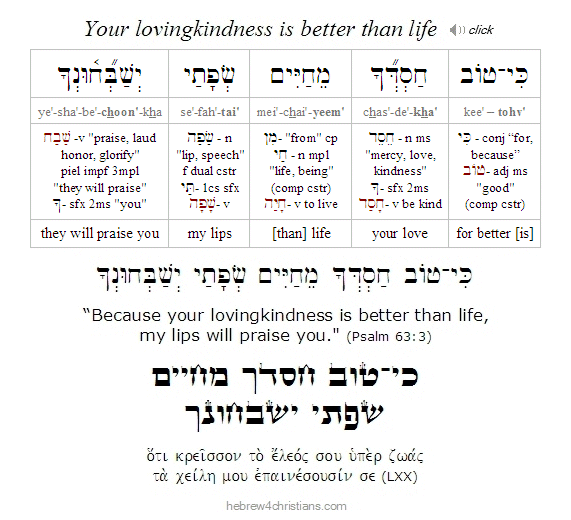
The Promised Seed...

11.17.17 (Cheshvan 28, 5778) From our Torah portion this week (Toldot) we read that Rebekah had inquired of the LORD why her pregnancy was so oppressive (רָצַץ), and the LORD said to her: "Two nations are in your womb, and two peoples from within you shall be divided; the one shall be stronger than the other, the older shall serve the younger" (Gen. 25:23). Note here that the Hebrew word translated "older" (רַב) can mean "large" or "many," whereas the word translated "younger" (צָעִיר) can mean "small" or "insignificant." Surprisingly, God chose the "less likely" of the twins to carry out his purposes regarding the plan of salvation (1 Cor. 1:27-29). What is theologically interesting, however, is that the twins had not yet been born and yet their respective roles in the plan of redemption were foretold and disclosed. Right from within the womb they were separated, as it is written: "for before the twins were born or had done anything good or bad -- in order that God's purpose in election (ἐκλογή) might stand: not because of works but because of Him who calls -- Rebekah was told, "the older will serve the younger" (Rom. 9:11-13; Mal. 1:2-3). Now this might seem unfair, though remember that God has the prerogative regarding his choices (see Rom. 9:14-33), and moreover what God had decreed was the fulfillment of the blessing of Abraham, namely that through his Seed (i.e., the Messiah) all the peoples of the earth (including Esau's descendants) would be blessed (Gen. 12:3; Gen. 22:18; Acts 3:25; Gal. 3:8;16). God is the Master of the Universe, and all that he does is righteous and good.
For more on this see: "The Seed of Isaac: Further thoughts on parashat Toldot."
 |
Barrenness and Prayer...
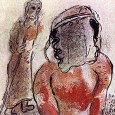
[ Our Torah portion this week (Toldot) explains that Isaac and Rebekah were still childless after 20 years of marriage... ]
11.17.17 (Cheshvan 28, 5778) "And Isaac prayed to the LORD for his wife, because she was barren" (Gen. 25:21). The midrash (בראשית רבה) on this verse says that the patriarchs and matriarchs (Sarah, Rebekah, Rachel) were childless for so long because God wanted them to stretch their hearts in earnest prayer... The commentator Rashi says the Hebrew word for "prayer," tefillah (תְּפִלָּה), implies bonding, communion, and cleaving to God, and the times of barrenness were meant to draw the heart closer to God for help... We may know some things of Torah; we may suppose we understand truth from Scripture, but prayer from the heart unites us to the LORD our God. "Teach me your way, O LORD, and I will walk in your truth; unite my heart to fear your Name" (Psalm 86:11).
הוֹרֵנִי יְהוָה דַּרְכֶּךָ אֲהַלֵּךְ בַּאֲמִתֶּךָ
יַחֵד לְבָבִי לְיִרְאָה שְׁמֶךָ
ho·re·ni · Adonai · dar·ke·kha · a·ha·lekh · ba·a·mi·te·kha
ya·ched · le·va·vi · le·yir·ah · she·me·kha

"Teach me your way, O LORD, and I will walk in your truth;
unite my heart to fear your Name."
(Psalm 86:11)

Download Study Card
Note: For more on this subject, see "Barrenness and Prayer."
Fear and Trembling...

11.16.17 (Cheshvan 27, 5778) From the Torah this week (Toldot) we read: "And Isaac trembled a very great trembling" (וַיֶּחֱרַד יִצְחָק חֲרָדָה גְּדלָה עַד־מְאד) and said, "Who ... came before you that I have blessed? Yes, and he shall be blessed" Gen. 27:33). Some of the sages asked why Isaac so greatly trembled were it not that he had suddenly realized that he had been deceived and mistaken about Esau his entire life? His poor judgment shook him to the foundations, nearly leading him to fail one of the most important tests of his life. Had Esau been successful in obtaining the blessing, the entire future of the Jewish people would have been jeopardized, most particularly the genealogy of our Messiah Yeshua the Savior. This teaches us that we must be vigilant when we are confronted with difficult decisions, walking in "fear and trembling" lest we choose unwisely, as it is written, "Without guidance a people falls; but deliverance comes from a multitude of counselors" (Prov. 11:14).
בְּאֵין תַּחְבֻּלוֹת יִפָּל־עָם
וּתְשׁוּעָה בְּרב יוֹעֵץ
be'ein · tach·bu·lot · yi·pal · am
ut·shu·ah · be·rov · yo·etz

"Without guidance a people falls;
but deliverance comes from a multitude of counselors"
(Prov. 11:14)

"Do not be sure of yourself until the day you die; do not judge your friends until you are in their place; and do not say, 'When I have time I will study,' since you may never have the time" (Hillel). Instead pray to God as David did: "Cause me to know your ways, O LORD; teach me your paths; cause me to walk in your truth and teach me; for You are the God of my salvation (literally, אֱלהֵי יִשְׁעִי, "God my Yeshua"), for you I hope all the day long..."
דְּרָכֶיךָ יְהוָה הוֹדִיעֵנִי ארְחוֹתֶיךָ לַמְּדֵנִי
הַדְרִיכֵנִי בַאֲמִתֶּךָ וְלַמְּדֵנִי כִּי־אַתָּה אֱלהֵי יִשְׁעִי
אוֹתְךָ קִוִּיתִי כָּל־הַיּוֹם
de·ra·khe'·kha · Adonai · ho·di·ei'·ni · o·re·cho·te'·kha · la·me·dei'·ni
ha·dri·khei'·ni · va·a·mi·te'·kha · ve·la·me·dei'·ni · ki · a·tah · E·lo·hei · yi·shi
o·te·kha · ki·vi'·ti · kol · ha·yom

"Cause me to know your ways, O LORD; teach me your paths;
Cause me to walk in your truth and teach me; for You are the God of my salvation,
for you I hope all the day long."
(Psalm 25:4-5)

The Legacy of Faith...
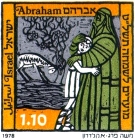
11.16.17 (Cheshvan 27, 5778) The Hebrew word "toldot" (תּוֹלדת) means "generations" or "descendants," and indeed the main theme of this vital Torah portion has to do with the continuity of the spiritual legacy of Abraham. The family drama and the awkward scheme to attain the legacy was a bit premature, however, since Isaac was not ready to bless either of his sons, at least not until his eyes were opened to understood the truth; only then would Isaac be able to bequeath the blessing the LORD had given to him (and as God gave to his father Abraham): "Fear not; I am with you; I will bless and increase your offspring..." (Gen. 26:23-25). In other words, though Isaac may have originally intended to bless his firstborn son Esau, God overruled the decision and thereby brought Isaac to do teshuvah. The blessing was therefore to be wholeheartedly imparted only later, at the end of the parashah, where we read: וַיִּקְרָא יִצְחָק אֶל־יַעֲקב וַיְבָרֶךְ אתוֹ- "So Isaac summoned Jacob and blessed him" saying, "May El Shaddai bless you, make you fruitful and numerous," and - וְיִתֶּן־לְךָ אֶת־בִּרְכַּת אַבְרָהָם לְךָ - "may He give you the blessing of Abraham" (see Gen. 28:1-4).
 |
God's Oath of Blessing...
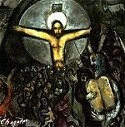
11.16.17 (Cheshvan 27, 5778) In our Torah portion this week (Toldot) we learn that the great oath of blessing that God gave to Abraham was extended (exclusively) to his beloved son Isaac (Gen 26:3-4; Rom. 9:7). Recall that it was only after the Akedah (the sacrifice of Isaac) that the LORD God swore the oath (שְׁבוּעָה) that through Abraham would all the families of the earth be blessed: "By myself I have sworn, declares the LORD, because you have done this and have not withheld your son, your only son (ben yachid), I will surely bless you... and in your offspring shall all the nations of the earth be blessed, because you have obeyed my voice" (Gen. 22:16-18; cp. Gal. 3:9,16). The phrase, "by myself have I sworn" is the most solemn oath God could make and must be regarded as an inviolable vow (Heb. 6:13-18). It is nothing short of astounding to realize that the very existence of Israel and the Jewish people - and therefore the advent of the Messiah himself - derives from the Abraham's willingness to sacrifice his "only begotten son," an act of faith that constituted the revelation of "deeper Torah" later enshrined in the laws of sacrifice given at Sinai. That is why the key idea of the Torah centers on the idea of atoning sacrifice, and in particular, the continual sacrifice of the lamb. Indeed atonement is the central theme of the central book of Torah, i.e., Leviticus, where we are called to draw near to God through sacrificial rites, the foremost of which was the ongoing offering (i.e., korban tamid: קָרְבַּן תָּמִיד) of a defect-free male lamb, together with unleavened bread and wine. The LORD called this "My offering, My bread" (Num. 28:1-8). In other words, the very center of the Torah is the altar that constantly prefigured the Lamb of God who would be offered up to secure our eternal redemption (John 1:29; Heb. 9:11-12). Yeshua is our "lamb offered in the morning and in the evening," and His sacrificial life embodies God's passion for you to receive his love.
For more on this subject, see "Israel and the Akedah" here.
 |
Two Blessings for Jacob...

[ The following is related to this week's Torah reading, parashat Toldot... ]
11.15.17 (Cheshvan 26, 5778) When we think of Jacob as a young man, we naturally tend to recall the dramatic episode when he surreptitiously disguised himself as Esau to "steal" the blessing from his father Isaac. In this week's Torah reading, however, we discover that Jacob actually received two blessings from his father. The first blessing -- given to a disguised Jacob -- focused on material blessings: the "dew of heaven," the "fatness of the earth," "plenty of grain and wine," political power and hegemony (Gen. 27:28-29), whereas the second blessing -- given to an undisguised Jacob -- focused on his role as God's chosen patriarch of Israel (Gen. 28:3-4). The difference between these blessings turned on Isaac's restored vision. His first blessing was tailored to the character of Esau as his "natural choice," whereas his second blessing looked beyond mere appearances to behold the vision that was originally given to his father Abraham:
וְאֵל שַׁדַּי יְבָרֵךְ אתְךָ
וְיַפְרְךָ וְיַרְבֶּךָ וְהָיִיתָ לִקְהַל עַמִּים
וְיִתֶּן־לְךָ אֶת־בִּרְכַּת אַבְרָהָם
לְךָ וּלְזַרְעֲךָ אִתָּךְ
ve'el · Shad·dai · ye·va·rekh · ot·kha
ve'yaf·re·kha · ve'yar·be·kha · ve'ha·yi·ta · lik·hal · a·mim
ve'yit·ten · le·kha · et · bir·kat · Avraham
le·kha · ul·zar·a·kha · i·takh

"May El Shaddai bless you,
make you fertile and numerous to become an assembly of peoples.
And may He grant the blessing of Abraham
to you and your offspring."
(Gen. 28:3-4)
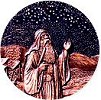
- Isaac's second blessing to Jacob
In a sense, the self-effacing, disciplined, and strong-willed Isaac abandoned his "natural vision" (i.e., to install Esau as the next patriarch, despite the assumed remonstration of his wife Rebekah) by finally surrendering to the vision of his father Abraham. Isaac's entire life was a sort of overreaction to his father - an "antithesis to Abraham's thesis." By choosing to bless Jacob a second time, this time with his eyes wide open, Isaac revealed that he had finally accepted the grace of God that was revealed to his father Abraham.
Recall that after Esau discovered that the blessing was given to Jacob, he lamented and pleaded with his father to bestow upon him a blessing as well. It is interesting to note that the "residual" blessing that Isaac gave to Esau was the inverse of that given to Jacob: the "fatness of the earth" was put before the "dew of heaven" (compare Gen. 27:39 with Gen. 27:28). Receiving sustenance from heaven is of greater value than finding earthly prosperity. And indeed, Jacob was "blessed" with trouble his whole life, which caused him to rely on the "dew from heaven," whereas Esau was "blessed" with prosperity (and trouble) that came from trafficking in this world....
Note: The metaphors the "dew of the heavens" and the "fatness of the earth" suggest focus, the former alluding to spiritual blessing and the latter to worldly good... Hence Jacob was later vexed and sent into exile, whereas Esau inhabited Mount Seir and embedded himself in the land. Isaac's first blessing (to a disguised Jacob), does not contradict this comment, since Isaac was speaking prophetically about Jacob and Esau, and only later did he reaffirm the prophecy by bestowing upon Jacob the blessing of his father Abraham...
 |
Courage and Suffering...

11.15.17 (Cheshvan 26, 5778) "In the world you will have tribulation. But take heart; I have overcome the world" (John 16:33). There are some well-meaning souls who seem to think that the life of faith in Yeshua should be relatively pain-free and without the normal sorts of infirmities that affect all people. These people seem to reason that since Yeshua died on the cross as a ransom for our sins, being bruised for our iniquities, we should therefore be set free from pain and sickness of every kind (based on their reading of Isa. 53:5, and in particular the Hebrew phrase וּבַחֲבֻרָתוֹ נִרְפָּא־לָנוּ, "by his wounds we are healed"). This implies that if a Christian gets sick or experiences loss in their life, then he/she must somehow be deficient either in their understanding of the power of the atonement or in the exercise of their faith... Tragically, such inferences can bring great heartache to others, though they are based on faulty reading of Scripture, as discussed in this audio.
For more discussion on this subject see:
Isaac's Troubled Family...

[ The following is related to this week's Torah reading, parashat Toldot... ]
11.14.17 (Cheshvan 25, 5778) The sages talk about the "voice of Jacob" and the "hands of Esau" (Gen. 27:22). Both sons were counterparts of one another, though each needed the qualities of the other to be complete. Esau needed to learn the ways of Jacob - to love Torah, to respect the call of the family to be God's agents in the world, to value the things of heaven, and so on, whereas Jacob needed to learn the ways of Esau - to be a man of action, to work with his hands, to deal with the rough-and-tumble world at large. After Jacob fled to Charan to escape the clutches of his aggrieved brother, he learned to be a shepherd, a husband, and a father. In this way Jacob also learned the value of the blessing given to Esau, although this too was discovered needlessly late in his life.
It is quite clear that the families of the patriarchs had serious struggles and were often quite "dysfunctional." If we idealize these people, however, we tend to forget their humanity, and they may appear disconnected from us - on a much higher spiritual level. The story of Isaac's troubled family is ultimately one of hope for us all. Isaac was deeply wounded but ultimately found healing, just as his son Jacob later wrestled through his family issues to be renamed "Israel." Take heart, chaverim: God can use us for His kingdom purposes despite whatever wounds and troubles might be in our family backgrounds. The Spirit speaks: "I AM the LORD your healer" (אֲנִי יְהוָה רפְאֶךָ).
Note: For more on this topic see, "Isaac's Troubled Family: Further thoughts on Toldot."
 |
Through the Shadows...

11.14.17 (Cheshvan 25, 5778) "Whom have I in heaven but you? And there is nothing on earth that I desire besides you" (Psalm 73:25). Such is the "exile of hope" we suffer in this world... Torah begins: "In the beginning God created the heavens and the earth, and the earth was "tohu va'vohu v'choshekh" (תהוּ וָבהוּ וְחשֶׁךְ) - confusion and emptiness and darkness - which the sages interpret to mean that when we truly understand that God created the heavens and the earth, we will realize our earthy desires to be barren, empty and unreal. In their despair, Plato and the early Greek philosophers sought "timeless universals" which they believed disclosed the reality of an "upper world," a heavenly realm of unchanging goodness, beauty, and truth. The world we experience with our senses is a shadowy place of change and decay; but the real world, discerned by clear thinking, is a place of permanence, goodness and illumination. Likewise the righteous soul trusts that despite this fleeting world that turns to dust, there is an eternal realm, a place of abiding love, and a heavenly home. The land of promise is a "foreign land" to this world, but the heart of faith beholds "the city that has foundations, whose designer and builder is God" (Heb. 11:10). "For here we have no lasting city, but we seek the city that is to come" (Heb. 13:14). Therefore "we look not to the things that are seen but to the things that are unseen; for the things that are seen are transient (πρόσκαιρος), but the things that are unseen are eternal. For we know that if the tent that is our earthly home is destroyed, we have a building from God, a house not made with hands, eternal in the heavens" (2 Cor. 4:18-5:1). In this world we suffer exile, groaning to be with our Savior, the Source of all blessing: "I say to the LORD, "You are my Lord; I have no good apart from you" (Psalm 16:2).
shom·rei·ni · el · ki-cha·si·ti · vakh
a·mart · la·do·nai · a·do·nai · at·tah · to·va·ti · bal-a·le·kha

"Protect me, O God, for in you I take refuge.
I say to the LORD, "You are my Lord; I have no good apart from you."
(Psalm 16:1-2)

Witness of the Spirit...
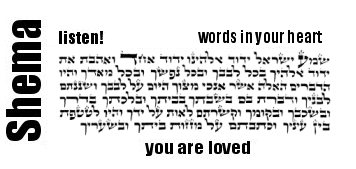
11.14.17 (Cheshvan 25, 5778) "Hear, O Israel: The LORD our God, the LORD is one" (Deut. 6:4). The sages say that the Shema (שְׁמַע) is our central affirmation because it expresses our acceptance to sanctify the LORD God within our hearts so that others will see that He is the one and only God. Likewise, where it says וְאָהַבְתָּ אֵת יְהוָה אֱלהֶיךָ - "You shall love the LORD your God" (Deut. 6:5), this means you shall make the LORD beloved – first to your own heart and then before the eyes of others... The Shema testifies of our faith in God, and we "hear" the truth when we live in the love and grace of the Lord.
שְׁמַע יִשְׂרָאֵל יְהוָה אֱלהֵינוּ יְהוָה אֶחָד
she·ma · Yis·ra·el · Adonai · E·lo·hei·nu · Adonai · e·chad

"Hear, O Israel, the LORD is our God; the LORD is One."
(Deut. 6:4)

Shema Reader Page
Ve'ahavta -- "You shall love (וְאָהַבְתָּ) the LORD your God with all your heart, and with all your soul, and with all your might" (Deut. 6:5). Only God can quicken a dead heart, after all, and fill the soul with holy affections. Only the LORD can impart to us strength needed to take hold of promises as He writes His Torah upon our heart. As it is written, "For from him and through him and to him are all things. To him be glory forever" (Rom. 11:36).
Everything you need...
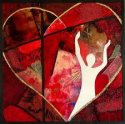
11.14.17 (Cheshvan 25, 5778) "Know therefore this day, and return (shuv) to your heart, that the LORD is God in heaven above and on the earth beneath; ein od (אֵין עוֹד) - there is nothing else" (Deut. 4:39). The sages say the meaning of "ein od" is not simply that there is no other God than the LORD, since that has already been established, but rather that there is no existence in the universe apart from God, and that God alone sustains and upholds all things by the Word of his Power (Heb. 1:3). As the Spirit attests: "Worthy are you, our Lord and God, to receive glory and honor and power, for you created all things, and by your will they existed and were created" (Rev. 4:11). Mi li vashamayim? "Whom have I in heaven but you? And there is nothing on earth that I desire besides you. My flesh and my heart may fail, but God is the Rock of my heart (צוּר־לְבָבִי) and my portion forever" (Psalm 73:25-26).
מִי־לִי בַשָּׁמָיִם וְעִמְּךָ לא־חָפַצְתִּי בָאָרֶץ
כָּלָה שְׁאֵרִי וּלְבָבִי צוּר־לְבָבִי וְחֶלְקִי אֱלהִים לְעוֹלָם
mi-li · va·sha·ma·yim · ve·im·me·kha · lo-cha·fatz·ti · va·a·retz
kal·lah · she·ei·ri · u·le·va·vi · tzur-le·va·vi · ve·chel·ki · E·lo·him · le·o·lam

"Whom have I in heaven but you?
And there is nothing on earth that I desire besides you.
My flesh and my heart may fail,
but God is the strength of my heart and my portion forever."
(Psalm 73:25-26)

Hebrew Study Card
With God's love we have everything we need - even should we experience temporal lack; but without it we are truly destitute - even should we gain everything the world affords. "For what will it profit a man if he gains the whole world and forfeits his soul?" (Matt. 16:26).
Note: Some of the sages interpret "know therefore this day... "there is no one else." In other words, ein od (אֵין עוֹד) means "there is no other" than you -- there is no other person than yourself upon whom this responsibility falls... God created Adam alone because his image rested upon one for whom he created the world, and yet Adam was to "guard and work" the garden. Likewise each individual must take responsibility to "know therefore this day that the LORD is God" by working out his faith in the world (Phil. 2:12-13).
Blessings of Bean Soup...

[ The following is related to this week's Torah reading, parashat Toldot... ]
11.13.17 (Cheshvan 24, 5778) From our Torah this week (i.e., parashat Toldot) we read: "Then Jacob gave Esau bread and lentil stew (לֶחֶם וּנְזִיד), and he ate and drank and rose and went his way. Thus Esau despised (בָּזָה) his birthright (בְּכרָה)" (Gen. 25:34). Esau esteemed the honor of being the firstborn son (i.e, bechor: בְּכוֹר) – the high priest of the family – as worth a "bowl of beans" when compared with the drive of his lower nature, and so he tragically forfeited the blessing of God... Far from regarding service to God as a divine privilege and wonderful opportunity to benefit his family, Esau wanted to be free of such responsibilities and therefore discredited the meaning and promise of faith. Note that the Hebrew word for "lentil stew" (or pottage) is nazid (נָזִיד), which comes from a Hebrew word that means "to boil up" in pride (i.e., zid: זִיד). Sadly, Esau was consumed with his own interests and regarded them as more important than the things of God.
Note: "Then Jacob gave Esau bread and lentil stew, and he ate and drank and rose and went his way. Thus Esau despised his birthright" (Gen. 25:34). Most translations of the Hebrew text suggest that because he bartered his birthright Esau disparaged it, but the text also implies continuity: after he ate, drank, and went his way, then Esau rationalized his bad decision by denying its importance...
 |
Remove your Shoes...
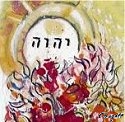
11.13.17 (Cheshvan 24, 5778) We live in the midst of a mysterious universe filled with astounding wonder and vast complexity, from the smallest of subatomic particles to the largest of cosmic events... If we could really see, if our eyes were truly open, we would understand that the universe and everything in it is filled with God's glory (Psalm 19:1). Where it is written, "Remove your shoes, for the place you are standing is holy" (Exod. 3:5) means we are to remove the deadness of our habits, those routine ways of "sightless seeing" that insulate us and hide us from the astonishment of reality. "Holy, holy, holy is the LORD of hosts; the whole earth is full of his glory!"
קָדוֹשׁ קָדוֹשׁ קָדוֹשׁ יהוה צְבָאוֹת
מְלא כָל־הָאָרֶץ כְּבוֹדוֹ
ka·dosh · ka·dosh · ka·dosh · Adonai · Tze·va·ot,
me·lo · khol · ha·a·retz · ke·vo·do

"Holy, holy, holy is the LORD of hosts;
the whole earth is full of his glory!"
(Isa. 6:3)

Download Study Card
The LORD is the Source of all existence. This is implied in the Name YHVH (יהוה) itself, which comes from the Hebrew verb "to be" (hayah), and therefore God is called ha-hoveh, ve'hayah, ve'yavo (הַהוֶה וְהָיָה וְיָבוֹא) - "the One who is, and was, and is to come" (Rev. 4:8). God first defined His essential Name to Moses as ehyeh asher ehyeh (אֶהְיֶה אֲשֶׁר אֶהְיֶה), "I AM that I AM," abbreviated simply as ehyeh (אֶהְיֶה), "I AM" (Exod. 3:14). This "threefold" Name of the LORD of Hosts encompasses all possible states of being, so that of the LORD alone it is said, melo kol ha-aretz kevodo: "the whole earth is full of his glory" (Isa. 6:3).
A Blessed Longing...

11.13.17 (Cheshvan 24, 5778) Our Lord said: "Blessed are those who hunger and thirst for righteousness..." (Matt. 5:6). Yes, blessed are those who suffer such desperate need, who know inner emptiness, who are not made numb to the ache, and who cry from the heart for deliverance. Blessed are those who are in dread over themselves, who fall as one dead before the Divine Presence, who know they are undone, ruined, and dying for life... The great danger, spiritually speaking, is to become complacent, untouched by poverty of heart, to be lulled asleep, lost within a dream, made comatose, living-yet-dead. The gift of faith first reveals our own lostness and then imparts courage to live with ourselves despite ourselves as we seek God's healing and life...
אַשְׁרֵי הָרְעֵבִים וְהַצְּמֵאִים לִצְדָקָה
כִּי־הֵם יִשְׂבָּעוּ
ash·rei · ha·re·'vim · ve·hatz·tze·mei·im · litz·da·kah
ki · hem · yis·ba·u

"Blessed are those who hunger and thirst for righteousness,
for they shall be filled"
(Matt. 5:6)

Revelation of Decision...

11.13.17 (Cheshvan 24, 5778) Every one of us is a teacher of sorts, proclaiming through our personal choices what we believe to be true. False teachers are those whose choices "teach" that there is no God, no eternal life, no meaning to life, and ultimately, no real hope... It cannot be any other way, for we all teach by our choices; we communicate by our assumptions of what we regard is of "ultimate concern." Don't be fooled by the phony intelletuals of our day: so-called "postmodern" philosophy never answered any of the haunting existential questions of life, such as: What is reality? Why is there something rather than nothing? What is the purpose of life? What happens when we die? Who am I? Do moral choices matter? and so on, but instead merely reinterpreted the hunger for meaning to be about power and control... Nonsense! People may evade the great questions of life by pretending they are unknowable, but Scripture attests that all people are created in God's image and are intuitively aware of God's reality and power: "For His invisible attributes, namely, his eternal power and divine nature, have been clearly perceived, ever since the creation of the world, in the things that have been made; so they are without excuse" (Rom. 1:20). We have a sacred duty to honor God's truth and that implies we bear a sacred animosity toward lies and false teaching. "Do not be deceived: associating with false teaching corrupts good character" (1 Cor. 15:33). We abhor sin because it wounds and kills the soul. Think straight; awaken to the holiness of life; turn away from vain thoughts and lies; embrace the truth of God's salvation.
Every day we make decisions regarding good and evil, and therefore every day we are deciding (i.e., proclaiming, teaching, and attesting) our faith to others. The issue is not whether we will teach others, but what we will teach by the testimony of our lives and the decisions we make regarding our ultimate concerns.
יִרְאַת יְהוָה שְׂנאת רָע
גֵּאָה וְגָאוֹן וְדֶרֶךְ רָע
וּפִי תַהְפֻּכוֹת שָׂנֵאתִי
yir·at · Adonai · se·not · ra,
ge·ah · ve·ga·on · ve·de·rekh · ra
u·fi · tah·pu·khot · sa·nei·ti

"The fear of the LORD is hatred of evil.
Pride and arrogance and the way of evil
and perverted speech I hate."
(Prov. 8:13)
Contrary to the philosophy of this fallen world, the essence of love is to hate what is evil; just as it is hateful to be "tolerant" of what is wicked... Followers of Yeshua must love the truth and abhor the lie. Tolerating sin in a world ripe for judgment is a tacit form of "collaboration" with the enemy... Indeed, the only thing regarded as intolerable in the devil's world is the objection that people have a supposed "liberty" to sin. But the LORD is clear on this point: those who call evil good and good evil are as good as dead. Therefore we are enjoined: "O you who love the LORD, hate evil" (Psalm 97:10). Yes, hate what is evil and love what is good (Amos 5:15). The connection between loving God and hating evil is repeated in the New Testament: "Let your love be genuine (ἀνυπόκριτος, without a "mask" put on): abhor what is evil; cling to what is good (Rom. 12:9). If we truly love the LORD, let us walk in the awe of His great Name by hating what is evil.
The Akedah of Jacob...
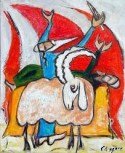
[ The following is related to this week's Torah reading, parashat Toldot... ]
11.13.17 (Cheshvan 24, 5778) How did Jacob feel about his part in the deception of his father Isaac? He undoubtedly was aware of the unusual circumstances of his birth, and in particular of the prophecy given to his mother that he, and not his older brother Esau, would be the heir of Isaac and of the Jewish people (Gen. 25:23; Gen. 25:28). The Torah describes the character of Jacob as a wholesome person, a man of integrity (אִישׁ תָּם) who dwelt in tents (Gen. 25:27), and yet he was forced to choose whether he would obey his mother's will to deceive his father or to adhere to his personal integrity. This explains why at first Jacob "bartered" for the blessing of the firstborn (בְּכוֹר) when he and Esau were younger (Gen. 25:31), hoping to resolve the matter peaceably, but after it became clear that Isaac intended to bless Esau as the family's heir, Rebekah took matters into her own hands (Gen. 27:1-ff). This dilemma was Jacob's "Akedah," if you will, the sacrifice of himself for the will of God. Three times does the Torah indicate the pain of Jacob during this ordeal: "And he went (וַיֵּלֶךְ) and he took (וַיִּקַּח) and he brought (וַיָּבֵא) to his mother..." (Gen. 27:14). The sages here note that the repeated use of וי, meaning "woe," suggested the turmoil Jacob felt as he prepared to deceive his father. On the other hand, Rebekah's deception of her husband was intended to show Isaac that he was gullible and thereby easily deceived by Esau's hypocrisy. It was an object lesson, if you will, rather than a outright case of "stealing." After all, Esau was soon to arrive - venison in hand - and the charade would be exposed for all to see... No, Rebekah's plan was to "open the eyes" of her myopic husband, revealing to him that he had been guilty of sacrificing the righteous son Jacob for the sake of deceptive Esau.
For more discussion on this subject see:
Rosh Chodesh Kislev...
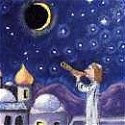
11.12.17 (Cheshvan 23, 5778) This coming Saturday, November 18th (after sundown) marks "Rosh Chodesh Kislev." On the Biblical calendar the month of Kislev (כִּסְלֵו) is the ninth of the year (counting from Nisan), and it is also one of the "darkest," with the days progressively getting shorter and the nights getting progressively longer. Kislev is perhaps best known for the eight day holiday of Chanukah (חג החנוכה) which begins on the 25th of the month (Tues. Dec. 12th) and runs through the third day of the following month (of Tevet). Since there is always a new moon during the season of Chanukah, it is no wonder that this holiday represents an appropriate time to kindle the lights of faith, and especially to recall the advent of Yeshua the Messiah, the Light of the World (אוֹר הָעוֹלָם).
יְהִי רָצוֹן מִלְּפָנֵיךָ יהוה אֱלהֵינוּ וֵאלהֵי אֲבוֹתֵינוּ
שֶׁתְּחַדֵּשׁ עָלֵינוּ חדֶשׁ טוֹב בַּאֲדנֵינוּ יֵשׁוּעַ הַמָּשִׁיחַ אָמֵן
ye·hi · ra·tzon · mil·fa·ne·kha · Adonai · E·lo·hei·nu · ve·lo·hei · a·vo·tei·nu
she·te·cha·desh · a·lei·nu · cho·desh · tov · ba'a·do·nei·nu · Ye·shu·a · ha·ma·shi·ach · A·men

"May it be Your will, LORD our God and God of our fathers,
that you renew for us a good month
in our Lord Yeshua the Messiah. Amen."

Download Blessing Card
Chodesh Kislev is sometimes called the "month of dreams" because the weekly Torah portions for this month contain more dreams than any other in the Scriptures. No less than nine dreams (of the ten in the Torah) appear in the four portions of Vayetzei, Vayishlach, Vayeshev, and Miketz - all of which are usually read during the month of Kislev. In the Torah, the primary figure connected with dreams is Jacob's son Joseph, who was nicknamed by his brothers as "that dreamer" and who was later named "Decipherer of Secrets" (Tzofnat Paneach) by Pharaoh (Gen. 41:45). Joseph was able to authentically mediate the spiritual and the physical realms through the Spirit of God within him (Gen. 41:38). Prophetically Joseph represents Yeshua the "disguised Egyptian" who likewise was rejected and hated by his brothers but who later became their savior (for more see "Mashiach ben Yosef").
For more on this subject, see "Chodesh Kislev."
Parashat Toldot - תולדת

11.12.17 (Cheshvan 23, 5778) Last week's Torah (i.e., Chayei Sarah) told how Abraham's faithful servant Eliezer sought a bride for Isaac from among Abraham's relatives living in Mesopotamia. In response to his prayer to the LORD, Eliezer was shown that Abraham's nephew's daughter Rebekah was chosen to be one of the great matriarchs of Israel.
This week's reading (Toldot) continues the story by revealing that Isaac and Rebekah had been married for twenty years but were still without an heir to carry on the family line. Finally their prayers were answered and Rebekah conceived, though not without complications. When she inquired of the LORD about her travail, God told her that she was carrying twins that would be heads of two rival nations, but the younger child would in fact become the promised heir of the chosen people. When the day arrived for Rebekah to give birth, the first child came out "red and covered with hair," so they called his name "Esav" (i.e., עֵשָׂו, "hairy"); then his brother came out with his hand grasping Esau's heel (i.e., akev: עָקֵב), so they named him "Ya'akov" (יַעֲקב) from the Hebrew verb (i.e., akav: עָקַב), meaning "to take by the heel; to displace; to supplant."
The Torah describes that Esau became a hunter, "a man of the field," while Jacob was ish tam yoshev ohalim, "a wholesome man, who lived in tents." Isaac favored Esau; but Rebekah, believing the promise of the LORD, favored Jacob...
The portion then gives us a look at the spiritual life of the two boys. According to Jewish tradition, on the day of the funeral of their grandfather Abraham, Jacob was cooking lentil soup for Isaac, the traditional mourner's meal. Esau rushed in from a hunting expedition, exhausted and hungry. He then begged Jacob to give him some of "that red stuff" (i.e, ha'dom hazeh), but Jacob answered that he would give him some only if he would sell him his birthright. Esau agreed to the terms and discounted his birthright as being worth only a bowl of beans (on account of this incident, Esau was given the additional name of Edom ("red"). In this manner the Torah describes how Esau "spurned the birthright."
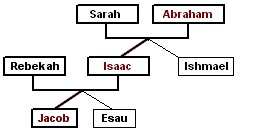 |
Years later, when Isaac was old and blind, Jacob (with his mother Rebekah's help) tricked Isaac into conferring the blessing of the firstborn upon him, thereby making Jacob the heir of the family, and not Esau. When the ruse was discovered, however, Esau sought to kill his brother, and Jacob was forced to flee his home, never to see his mother again...
Know Him in all your ways...

11.10.17 (Cheshvan 21, 5778) Where it says, "Know Him in all your ways" (Prov. 3:6), that includes the way of your sins, old seemingly intractable habits of character, and the deepest wounds of your soul. "Pray without ceasing" -- in the midst of your temptations, as you encounter the allure of lust, the fires of anger, or simply the desire to fade away.... Do not hide your struggle - your unclean thoughts, your ambivalence, your need for deliverance - but be quick to pray, to confess, and seek God's mercies. Yeshua is the Good Shepherd, and he is looking out for you, interceding for you, calling out to you in the midst of the storm.
בְּכָל־דְּרָכֶיךָ דָעֵהוּ
וְהוּא יְיַשֵּׁר ארְחתֶיךָ
be·khol · de·ra·khe·kha · da·ei·hu
ve·hu · ye·ya·sher · or·cho·te·kha

"Know Him in all your ways
and he will make your paths upright."
(Prov. 3:6)

(Hebrew Study Card)
The Torah says, "Know therefore today and return to your heart (וַהֲשֵׁבתָ אֶל־לְבָבֶךָ), for the LORD is God in heaven above and on the earth beneath; there is no other" (Deut. 4:39). Here we see the centrality of the heart as the place to encounter God (Luke 17:21). In all our ways we are to know Him, and that includes whatever way you find yourself in at this very hour. Today is the day of salvation; pour out your heart before him (Psalm 62:8).
Blessed in all things...

11.10.17 (Cheshvan 21, 5778) In the same verse that Abraham is described as "old and come into days" (זָקֵן בָּא בַּיָּמִים), he is also described to have been blessed bakol (בַּכּל) - "in everything" (Gen. 24:1). Contrary to the ideals of youth-obsessed culture, Torah regards aging as a process of construction, of upbuilding, of perfection -- not of decay. The sages say that the elderly "wear the days of their life as a garment," that is, as an accumulated "presence of days" that attends to the soul of the person. Indeed, the Talmud notes that the word zaken ("elder") can be read as zeh kana, "this one has it." Maturity and wisdom are qualities that should be honored in our culture -- not abhorred or disregarded. As the proverb puts it, עֲטֶרֶת תִּפְאֶרֶת שֵׂיבָה / aseret tiferet sevah: "Gray hair is a crown of glory" (Prov. 16:31). That God blessed Abraham "bakol" means that He revealed his presence to him in all things. This is the meaning of "Abraham was come into days." The days of his life were filled with the Divine Presence, and that is why he died contently (Gen. 25:8). Shabbat Shalom, chaverim. May you, too, be blessed in all things in Yeshua our Messiah (Eph. 1:3).
 |
Gift of our Days...
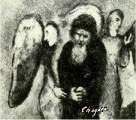
[ The following entry is related to this week's Torah reading, parashat Chayei Sarah.... ]
11.10.17 (Cheshvan 21, 5778) In this week's Torah portion (Chayei Sarah) we read about the death of Abraham, the original patriarch of the Jewish people and great hero of faith: "These are the days of the years of the life of Abraham, which he lived..." (וְאֵלֶּה יְמֵי שְׁנֵי־חַיֵּי אַבְרָהָם אֲשֶׁר־חָי) (Gen. 25:7). It is interesting to notice that this verse mentions Abraham's days but then goes on to state the number of years that he lived, indicating that we find meaning one day at a time, living in the present as we seek the Eternal... Why, then, does the verse mention the word "days" at all? Moreover, the verse includes the seemingly redundant clause, "which he lived" (אֲשֶׁר־חָי), an addition that appears to be unnecessary to the meaning. Since the sages assumed that there were no unnecessary words revealed in the Torah, they wondered why the verse was written this way....
When we reckon a person's life span, we (objectively) refer to their physical longevity in terms of years. This is why we celebrate birthdays, after all, and that's why we refer to someone as being so many years old. Jewish tradition recognizes calendar years, of course (our verse states that Abraham lived 175 years), though the sages understood time primarily in terms of "length of days." When the patriarch Isaac died, for example, the Torah says he was "gathered to his people, old and full of days" (Gen. 35:29). The sages defined a day (yom) in terms of the total time of daylight (measured from sunrise to sunset), and defined an hour (sha'ah) by dividing that time into 12 equal parts (this is called sha'ah zemanit, or a "proportional hour"). Each proportionate hour was then divided into 1080 "parts" (called chalakim), and each part (chelek) was further divided into 76 "moments" (rega'im). In other words, the sages measured time by increasingly smaller units, and these days, hours, "parts," and moments were used to objectively measure time (interestingly, modern science likewise attempts to "divide time" down to smaller and smaller units, until it defines it as the length of time required for light to travel in a vacuum, i.e., "Planck time." In other words, space and time are known through observing light).
Life is surely more than a quantitative measurement of time, however. What good is a physically long life without a relationship with God? Is it not "vanity of vanities," a "tale told by an idiot, full of sound and fury, signifying nothing," as Shakespeare once said? Time finds its qualitative meaning, its purpose, and its direction only in relationship with God, who is the "beginning, the middle, and the end." Our personal histories likewise have a beginning, middle, and an end that together form a "story" about who we are.... Your life is "going somewhere," and each moment of your day is your means to that end. Each moment leads inexorably to the next, and together these moments form hours, days, and the "days of the years." Teshuvah (repentance) is a conscious choice to turn to God amidst the flux of passing time in order to awaken to the realm of the eternal. Therefore we see the greatest of the tzaddikim (such as Abraham) living out the "days of the years" in conscious awareness of eternity, and of his ultimate destination: "By faith Abraham obeyed when he was called to go out to a place that he was to receive as an inheritance. And he went out, not knowing where he was going. By faith he went to live in the land of promise, as in a foreign land, living in tents with Isaac and Jacob, heirs with him of the same promise. For he was looking forward to the city that has foundations, whose designer and builder is God" (Heb. 11:8-10). Faith affirms that underlying the "surface appearance" of fleeting life (olam hazeh) is a deeper reality that is ultimately real and abiding (olam habah). It "sees what is invisible" (2 Cor. 4:18) and understands (i.e., accepts) that the "present form of this world is passing away," like so many seconds ticked off a clock (1 Cor. 7:31).
Time is God's gift to us, as well as a test... The story is told about how a man once spied the Vilna Gaon sitting at a table in the evening, weeping over a small piece of paper he had pulled from his pocket. After he wiped away the tears, the Gaon got up and left the room, leaving the paper on the table. The man who oversaw this then went over to look at the piece of paper and saw just seven dots marked on it, nothing else. Overcome by curiosity, the following morning the man asked the Gaon what the paper meant and why it made him cry. The Gaon then explained that each evening he would review how he used his time that day. For every moment he wasted, he would mark a dot on a piece of paper. At the end of the day he would look at the paper and ask God's forgiveness for wasting the time.
The point of the story is that time is a precious gift, and how we choose to live each moment makes an eternal difference in our lives. As Moses prayed, "Teach us to count our days rightly, that we may obtain a wise heart" (Psalm 90:13). We obtain such wisdom (chochmah) through the Torah: "And you shall meditate upon (the Torah) day and night" (Josh. 1:8). As disciples, we must study the Scriptures to show ourselves approved before God (2 Tim. 2:15). But study alone is not enough. We must practice the truth and walk it out in our daily lives: "Only take care, and keep your soul diligently... Turn not away from your heart all the days of your life" (Deut. 4:9). "Above all else, keep your heart with diligence, for from it are the outgoings of life" (Prov. 4:23).
הַדְרִיכֵנִי בַאֲמִתֶּךָ וְלַמְּדֵנִי
כִּי־אַתָּה אֱלהֵי יִשְׁעִי
אוֹתְךָ קִוִּיתִי כָּל־הַיּוֹם׃
ha·dri·khei·ni va·a·mit·te·kha ve·la·me·dei·ni
ki at·tah E·lo·hei yish·i
o·te·kha kiv·vi·ti kol ha·yom

"Lead me in your truth and teach me, for you are the God of my salvation;
for you I hope all the day long" (Psalm 25:5)

(Hebrew Study Card)
As followers of Yeshua, we are commanded to "redeem" (ἐξαγοράζω) the time, because the days are evil (Eph. 5:16). The Greek word used here implies exchanging the fleeting moments of the day with the conscious awareness that we will one day stand before the Judgment Seat of Messiah to give account for our lives (Matt. 12:36-37). May the LORD help us wake up and refuse to exchange the eternal treasure of the Kingdom of God for the fleeting vanities of this world, or to barter a present good at the expense of the eternal... As the late Jim Eliot reminded us, "He is no fool who gives what he cannot keep to gain what he cannot lose."
Turning Water to Wine...
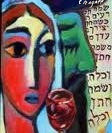
11.10.17 (Cheshvan 21, 5778) The first "sign" (σημεῖον) of the Messiah, namely, the miracle of turning water into wine during the wedding at Cana (John 2:1-11), prefigured his teaching about the new covenant and the wedding celebration to come. Yeshua transformed holy water intended for individual purification (i.e., mei niddah [מֵי נִדָּה], the waters that cleanse from contact with death), into a means of celebrating the gift of shared life. Instead of focusing on matters of personal holiness that might separate us, Yeshua brought love and union to the forefront. Morover, during his last Passover Seder with his disciples, Yeshua took the Third Cup, the Cup of Redemption, and sanctified it as the Cup of Betrothal, symbolizing his promise that one day we shall be united to him forever (Rev. 19:7).
It is noteworthy that Yeshua's earthly ministry began amidst betrothal and the celebration of love, and one of his central parables focused on whether people would accept the Father's invitation to join in the wedding celebration for his Son (Matt. 22:2-14). And in the world to come, we will forever celebrate the glory of God's eternal love for us...
 |
A Work of the Heart...

11.09.17 (Cheshvan 20, 5778) Some people imagine spirituality as a climb upward, an "ascent of the soul" that aims to reach God through the performance of certain meritorious actions... But God does not say "at the end of the way you will find me," but rather, "I AM the way, the very road under your feet, the Place (הַמָּקוֹם) where you are, the Bridge to the Father (John 14:6). The LORD is Present in every "here" and every "now." And no matter what our present circumstances, you will find God if you search "bekhol levavkha" - with all your heart, as it is written:
וּבִקַּשְׁתֶּם אתִי וּמְצָאתֶם
כִּי תִדְרְשֻׁנִי בְּכָל־לְבַבְכֶם
u'vik·kash·tem · o·ti · u·metz·a·tem
ki · tid·re·shu·ni · be·khol · le·vav·kem

"You will seek me and find me
if you search for me with all your heart"
(Jer. 29:13)

Hebrew Study Card
In logic if p then q implies -q then -p (contraposition). If you do not search for God bekhol levavkha - "with all your heart" - then you will not find him. The search comes through the heart, not the head... The Spirit of God's love calls out, "Seek Me and live" (Amos 5:4). If you are feeling empty today, ask God to feed you with His life-giving bread. Seek the LORD and His goodness. He is faithful and true and will surely answer the sincere cry of the heart: "You will seek me and find me, when you search for me with all your heart."
The Torah of Love...
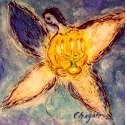
11.09.17 (Cheshvan 20, 5778) "Whoever has my commandments and keeps them, such is the one who loves me. And the one who loves me will be loved by my Father, and I will love him and will manifest myself to him" (John 14:21). Note that the Greek word translated "manifest" means to "shine inside" (i.e., ἐμφανίζω, from ἐν, "in" and φαίνω, "shine"), indicating that the revelation would be inward light of the Presence of Messiah himself (Χριστὸς ἐν ὑμῖν, ἡ ἐλπὶς τῆς δόξης, Col. 1:27). As we receive God's love, as we embrace it as our own, the love of Messiah will become visible to you. This comes from a place of inward surrender. As Paul Tillich said, "Sometimes in a moment of weakness light breaks into darkness, and it is as though a voice says, 'You are accepted; you are accepted... Do not seek for anything; do not perform anything; do not intend anything. Simply accept the fact that you are accepted.' If that happens to you, then you experience grace, and everything will be transformed."
 |
Our Daily Teshuvah...

11.08.17 (Cheshvan 19, 5778) There are first things without which nothing else follows... For instance teshuvah (i.e., "repentance") means letting go of those desires (or prejudices) that block or impede our reception of God's grace... This may include letting go of the supposed need to find our self-worth based on our performance rather than by accepting and resting in God's love for us. Therefore the very first commandment is always, Anochi Adonai Elohekha: "I AM the LORD thy God," which is the invitation to know God's heart. "Come unto me..." Finding God's heart for you is basic to the rest of the adventure of faith.
We must find focus to escape the distractions of the hour. Keep coming back! Keep turning! Teshuvah is a daily decision of the heart to seek what is real... abiding... true.
Are you "Yeshua Observant?"

11.08.17 (Cheshvan 19, 5778) When was the last time you sacrificed a lamb for your Passover seder? Or went to a religious service to offer a bullock for the guilt of your sin? Have you been careful to make pilgrimage three times a year to the Holy Temple to appear before the Lord as the Torah demands (Exod. 23:14-17)? And have you kept all the dietary laws and maintained personal cleanliness so you could participate in corporate worship? When was the last time you asked a woman if she were "niddah" so that you could safely shake her hand without becoming tamei (unclean)? Are you tempted to stone people to death who choose to disobey God's law or who dare to pick up sticks on the Sabbath day?
Questions like these are not meant to be taken lightly, and I am assuredly not trying to be flippant here, but it behooves us to take some time to sort through some of the tensions we might experience about the underlying question of whether Christians are required to follow the law of Moses or whether there is another way in light of the ministry of Yeshua...
At the outset it should be noted that many so-called "Torah observant" Messianic believers like to quote Yeshua's words from Matthew's gospel: "Do not think that I have come to destroy the Law or the Prophets; I have not come to destroy them but to fulfill them. For truly, I say to you, until heaven and earth pass away, not an iota, not a dot, will pass from the Law until all is accomplished. Therefore whoever relaxes one of the least of these commandments and teaches others to do the same will be called least in the kingdom of heaven, but whoever does them and teaches them will be called great in the kingdom of heaven" (Matt. 5:17-19). These people claim this passage is the "clarion call" for Messiah's followers are to be "Torah observant" and therefore to obey all the various commandments given in the written law of Moses. However as I will endeavor to show, this cannot be the correct implication based on many, many other considerations of Scripture and from clear teaching from our Lord himself, and therefore we need to exercise care before we regard this passage to be normative regarding how we are to understand the message of the gospel...
To see this, consider that over 40% of the Torah's written commandments focus on the laws of sacrifice to be performed at the Temple, and many other laws concern various social rules for establishing a theocratic kingdom and a system of justice through courts of law. There are also various ritual laws concerning the observance of the Sabbath and the various holidays (e.g., eating unleavened bread for seven days; living in a Sukkah, etc.) as well as purity laws concerning "clean and unclean" matters related to family life. In the written Torah there are laws concerning adultery, attaining inheritance, Levirate marriage, intermarriage with non-Jews, Nazirite vows, and so on. Moreover the Torah includes many agricultural laws that apply to farming practices in Israel (i.e, shemittah, bikkurim, leket, shechet, peah laws); while still other laws apply to civil matters of servitude and debt cancellation. Then there are various criminal laws regarding punitive justice, making restitution for theft, and so on, as well as blasphemy laws, laws regarding destroying idols, laws for warfare against pagan nations, laws for stoning adulterers and rebellious children, so on. And of course there are the spiritual and moral laws, too, such as the duty to love the LORD with all your being, and to love your neighbor as yourself... (For a complete list of the 613 commandments of the written Torah, see the Hebrew for Christians article "Taryag Mitzvot" ).
Now we believe that Yeshua is the embodiment of the Torah, the "living Torah," which means that He is the expression and end of the will of God. And while Messiah indeed is the true Lawgiver of Israel, he also expected his people to use their heads and to think through matters carefully before rendering their judgments (see John 7:24). After all, why was Moses instructed to establish an elaborate legal system with judges, courts, and even a supreme court (Sanhedrin) to adjudicate questions of the law (Exod. 18:13-26; Num. 11:24-29; Deut. 16:18-20; Deut. 17:8-12)? Moreover, how were Moses and Israel to have known the means to construct the Tabernacle and its furnishings apart from reasoning and discussion about the intent of the revelation given at Sinai? Unlike some other religions of the world that have a law book to exact strict justice for every infraction and circumstance, Torah requires us to interpret its meaning and to discern the intent of the law (Lev. 19:15; Deut. 1:16; 16:18).
In light of the foregoing considerations, then, let us look at some of the ways Yeshua dealt with the question of unthinkingly following the letter of the law of Moses apart from the deeper revelation of God's healing love and grace. In what follows I will present a number of examples and vignettes from Scripture that will give us insight regarding Yeshua's understanding and application of the law of Moses.
Here is one case, reading from the Gospel of Mark: "And Pharisees came up and in order to test him asked, "Is it lawful for a man to divorce his wife?" He answered them, "What did Moses command you?" They said, "Moses allowed a man to write a certificate of divorce and to send her away." And Yeshua said to them, "Because of your hardness of heart he wrote you this commandment... (Mark 10:2-5; see also Matt. 19:8-9). Note here that Yeshua plainly said that the "law" on divorce was given to accommodate the evil impulses of the heart, though such a law was never intended to be enacted. In other words, there are many laws given in the written Torah that, were it not for the problem of the heart, should never need to have been written down in the first place (see Mark 7:20-23). Laws against adultery, lying under oath, stealing, dishonoring parents, turning away from God, and so on, all were given in light of the "hardness of heart" that is here referred to by Yeshua. Likewise the apostle Paul spoke of the law as being given to constrain the evil latent within the unregenerated heart: "We know that the law is good, if one uses it lawfully, understanding this, that the law is not laid down for the just but for the lawless and disobedient, for the ungodly and sinners, for the unholy and profane, for those who strike their fathers and mothers, for murderers, the sexually immoral, men who practice homosexuality, enslavers, liars, perjurers, and whatever else is contrary to sound doctrine..." (1 Tim. 1:8-10).
Now let us consider Yeshua's view of the "law" of the Sabbath day. It can be assumed that Yeshua and his family surely observed the Sabbath and regularly attended synagogue (Luke 4:16). However later on, during the time of his active ministry we read that Yeshua's idea of the Sabbath included doing works of lovingkindness (gemilut chassidim): "At that time Yeshua went through the grain fields on the Sabbath. His disciples were hungry and began to pick some heads of grain and eat them. When the Pharisees saw this, they said to him, 'Look! Your disciples are doing what is unlawful on the Sabbath.'" But he said to them, "Have you not read what David did when he was hungry, and those who were with him: how he entered the house of God and ate the bread of the Presence, which it was not lawful for him to eat nor for those who were with him, but only for the priests? Or have you not read in the Law how on the Sabbath the priests in the temple profane the Sabbath and are guiltless? I tell you, something greater than the Temple is here" (Matt. 12:2-6). Here we see Yeshua's understanding that Sabbath is to be centered upon life and healing and not merely the abstention from work. When later Yeshua was accosted by the Pharisees regarding healing a man on the Sabbath day, we read that "he said to them, "Which one of you who has a sheep, if it falls into a pit on the Sabbath, will not take hold of it and lift it out? Of how much more value is a man than a sheep! So it is lawful to do good on the Sabbath" (Matt. 12:11-12). This is the principle of pikuach nefesh, saving a life, which preempts other considerations of religious observance… As Yeshua said, "man was not made for the Sabbath, but the Sabbath was made for man" (Mark 2:27).
Likewise we see Yeshua "violating" the traditions of the elders that is, not observing the minhagim (customs) of the sages that were presumably intended to put "a fence around Torah" by making principles of the law even more stringent. For example, during a meal, the Pharisees accused Yeshua for allowing his disciples to eat before they ceremonially washed their hands: "Then some Pharisees and teachers of the law came to Jesus from Jerusalem and asked, 'Why do your discipline break the tradition of the elders? They don't wash their hands before they eat.' He answered them, "And why do you break the commandment of God for the sake of your tradition? For God commanded, 'Honor your father and your mother,' and, 'Whoever reviles father or mother must surely die.' But you say, 'If anyone tells his father or his mother, "What you would have gained from me is given to God," he need not honor his father.' So for the sake of your tradition you have made void the word of God. You hypocrites! Well did Isaiah prophesy of you, when he said: "'This people honors me with their lips, but their heart is far from me; in vain do they worship me, teaching as doctrines the commandments of men'" (Matt. 15:1-9; see also Mark 7:1-16).
Here are a few additional examples. Recall that "the scribes and Pharisees brought a woman who had been caught in adultery, and placing her in the midst they said to him, "Teacher, this woman has been caught in the act of adultery. Now the Law Moses commanded us to stone such women. So what do you say?" This they said to test him, that they might have some charge to bring against him. Yeshua bent down and wrote with his finger on the ground. And as they continued to ask him, he stood up and said to them, "Let him who is without sin among you be the first to throw a stone at her." And once more he bent down and wrote on the ground. But when they heard it, they went away one by one, beginning with the older ones, and Jesus was left alone with the woman standing before him. Jesus stood up and said to her, "Woman, where are they? Has no one condemned you?" She said, "No one, Lord." And Jesus said, "Neither do I condemn you; go, and from now on sin no more" (John 8:3-11). A few comments about this are in order. First, note the audacity of Yeshua to forgive sins, which is considered the exclusive prerogative of God (Psalm 130:4; Dan. 9:9; Psalm 103:3; Jer. 33:8; Isa. 1:8; see Mark 2:7; Luke 5:21). As Yeshua rhetorically asked, however, "Which is easier, to say, 'Your sins are forgiven you,' or to say, 'Rise and walk'?" (Luke 5:23), and then proceeded to demonstrate the power of God. Secondly, note that Yeshua regularly regarded himself as the Judge of mankind, the One to whom all people shall give account (Matt. 19:28; Matt. 25:31-46; John 5:22; John 12:47-48; Acts 10:42; 2 Cor. 5:10; etc.).
The Torah clearly forbade touching those afflicted with tza'arat (or leprosy; see Lev. 14:1-9), though the New Testament provides testimony that Yeshua did just that. "And behold, a leper came to him and knelt before him, saying, "Lord, if you will, you can make me clean." And Yeshua stretched out his hand and touched him, saying, "I will; be clean." And immediately his leprosy was cleansed. And Yeshua said to him, "See that you say nothing to anyone, but go, show yourself to the priest and offer the gift that Moses commanded, for a proof to them" (Matt. 8:2-4; see also Mark 1:41; Luke 5:13). Likewise the Torah forbade touching a corpse at the expense of becoming unclean, yet Yeshua touched corpses and brought people back to life (Luke 7:14; Matt. 9:25). How was it possible for Yeshua to do these things and not be regarded as "unclean," unless he is the Authority of the Torah of the LORD (for more on this see the Mystery of the Red Heifer and the Gospel of the Red Cow).
Consider also that during the Time of the Second Temple, Jews were forbidden to associate with certain classes of people, such as Samaritans, Canaanites, as well as certain Romans and Greeks. Nevertheless, Yeshua took time to reveal himself to Gentiles and healed them as well: "A woman from Samaria came to draw water. Jesus said to her, "Give me a drink.".. The Samaritan woman said to him, "How is it that you, a Jew, ask for a drink from me, a woman of Samaria?" For Jews have no dealings with Samaritans! Yeshua answered her, "If you knew the gift of God, and who it is that is saying to you, 'Give me a drink,' you would have asked him, and he would have given you living water." The woman said to him, "Sir, you have nothing to draw water with, and the well is deep. Where do you get that living water? Are you greater than our father Jacob? ... The woman said to him, "I know that Messiah is coming (he who is called Christ). When he comes, he will tell us all things." Yeshua said to her, "I who speak to you am he" (John 4:7-26). Likewise Yeshua healed a Canaanite woman's daughter: "And behold, a Canaanite woman from that region came out and was crying, "Have mercy on me, O Lord, Son of David; my daughter is severely oppressed by a demon." But he did not answer her a word. And his disciples came and begged him, saying, "Send her away, for she is crying out after us." He answered, "I was sent only to the lost sheep of the house of Israel." But she came and knelt before him, saying, "Lord, help me." And he answered, "It is not right to take the children's bread and throw it to the dogs." She said, "Yes, Lord, yet even the dogs eat the crumbs that fall from their masters' table." Then Yeshua answered her, "O woman, great is your faith! Be it done for you as you desire." And her daughter was healed instantly" (Matt. 15:22-28). Another example concerns the healing of the Roman Centurion's servant (see Matt. 8:5-13). Why are these things significant? Because the Torah forbade interactions with the surrounding nations and cultures, but here we see Yeshua not only interacting with them but preaching to them and healing them and even revealing his identity to them. For instance, in the case of the Samaritan woman Yeshua explicitly told her that he was the Messiah, something he often withheld from others...
Yeshua also broke with Jewish religious tradition by vehemently denouncing the religious "gate keepers" of his day. He said "woe to you, teachers of the law and Pharisees, you hypocrites! You give a tenth of your spices – mint, dill and cumin. But you have neglected the more important matters of the law – justice, mercy and faithfulness. You should have practiced the latter, without neglecting the former" (Matt. 23:23). Likewise Yeshua overturned the money tables at the temple (John 2:15; Matt. 21:12; Mark 11:15); he interfered with the priestly duties at the Temple by causing the sacrifices to be stopped (Mark 11:15-19); forgave people of their sins apart from the prescribed sin offerings at the altar (Mark 2:5); and spent time with sinners and people of dubious reputation (Matt. 9:11; Luke 7:39; Luke 15:2; Luke 19:7) – indeed, Yeshua was called the "friend of tax collectors and sinners" (Matt. 11:19)! Yeshua was apparently not overly concerned with kosher law, either, and pointedly said, "Are you so dull?" Don't you see that nothing that enters a man from the outside can make him 'unclean'? For it doesn't go into his heart but into his stomach, and then out of his body." In saying this, Yeshua declared all foods "clean" (Mark 7:18-19). When Yeshua taught that we must forgive others and love our enemies, he likewise went against the general Jewish tradition of his day (see Matt. 5:43-44; Luke 6:27). Yeshua even claimed to forgive sins committed by one person against another, as if the sin was directed against him (Luke 7:36-49; Matt. 9:1-8; Mark 2:5-12; cp. 2 Sam. 12:13). As James later wrote, "Mercy triumphs over judgment" (James 2:13, cp. Psalm 85:10). Note that the law in the written Torah that states "an eye for an eye, tooth for a tooth" (Exod. 21:24) leaves both parties blind and in need of dental work.... The compassion (and righteousness) of God in Yeshua transcends the retributive aspects of the law.
Our Messiah clearly transcended the laws of Sabbath observance for the sake of healing and caring for others. We read in the gospel: "And a man was there with a withered hand. And they asked him, "Is it lawful to heal on the Sabbath?" -- so that they might accuse him. He said to them, "Which one of you who has a sheep, if it falls into a pit on the Sabbath, will not take hold of it and lift it out? Of how much more value is a man than a sheep. So it is lawful to do good on the Sabbath." Then he said to the man, "Stretch out your hand." And the man stretched it out, and it was restored, healthy like the other. But the Pharisees went out and conspired against him, how to destroy him (Matt. 12:10-14). Note how Yeshua used a kal va'chomer inference (i.e., קַל וְחמר, "light and weighty") to make his point, namely, that if a light condition is true, then a heavier one is certainly true. If saving the life of an animal is important, even if doing so involves "working" on the Sabbath day, then how much more should we save the life of a human being?
Yeshua exercised the authority that surpassed the law of Moses. In the famous Sermon on the Mount, he transcended the "outer" requirements of the law and forced the issue to be about inwardness. He said this, "You have heard that it was said to those of old, 'You shall not murder; and whoever murders will be liable to judgment.' But I say to you that everyone who is angry with his brother will be liable to judgment; whoever insults his brother will be liable to the council; and whoever says, 'You fool!' will be liable to the hell of fire" (Matt. 5:21-22). Do not miss the "audacity" of Yeshua's words: He was plainly claiming equal authority to the words of the written Torah, and by implication, the words of YHVH Himself. Likewise he told his disciples to follow a "new commandment"(מִצְוָה חֲדָשָׁה), namely to love as He loves us (John 13:34), and this love far exceeds the requirement to love your neighbor (Matt. 5:44; Luke 6:27, 35). We are explicitly forbidden in the Torah of Moses to eat blood, and yet Yeshua said, "Truly, truly, I say to you, unless you eat the flesh of the Son of Man and drink his blood, you have no life in you. Whoever feeds on my flesh and drinks my blood has eternal life, and I will raise him up on the last day." "It is the Spirit who gives life; the flesh is no help at all. The words that I have spoken to you are spirit and life" (John 6:53-63). This was metaphorical language meant to teach that we draw our live from his life, similar to the analogy of the Vine and the Branches he used later when he said to his disciples: "Abide in Me, and I in you," said Yeshua. "As the branch cannot bear fruit of itself, except it abide in the vine; no more can ye, except ye abide in Me" (John 15:5).
Spiritually speaking, Yeshua does what the law of Moses cannot do, namely, deliver people from the power of sin and death. Metaphorically the law is likened to a mirror that reveals our inner condition but is powerless to change our hearts (for more on this see the article, "The Problem of Torah"). By itself the law required the divine curse based on disobedience, since this is the truth of our condition, but Yeshua sets us free from our slavery to sin. "Yeshua answered them, "Truly, truly, I say to you, everyone who practices sin is a slave to sin. The slave does not remain in the house forever; the son remains forever. So if the Son sets you free, you will be free indeed" (John 8:34-36). Indeed, at the outset of his ministry Yeshua attested: "The Spirit of the Lord is upon me, because he has anointed me to proclaim good news to the poor. He has sent me to proclaim liberty to the captives and recovering of sight to the blind, to set at liberty those who are oppressed" (Luke 4:18). This is an example of the intimation given to the prophets of the deliverance to come: "Behold, the days are coming, declares the LORD, when I will make a new covenant with the house of Israel and the house of Judah, לא כַבְּרִית אֲשֶׁר כָּרַתִּי אֶת־אֲבוֹתָם - not like the covenant that I made with their fathers on the day when I took them by the hand to bring them out of the land of Egypt, my covenant that they broke, though I was their husband, declares the LORD. For this is the covenant that I will make with the house of Israel after those days, declares the LORD: I will put my Torah within them, and I will write it on their hearts. And I will be their God, and they shall be my people" (Jer. 31:31-33). Messiah is "the outcome of your faith, the salvation of your souls. Concerning this salvation, the prophets who prophesied about the grace that was to be yours, searched and inquired carefully, inquiring what person or time the Spirit of Messiah in them was indicating when he predicted the sufferings of Messiah and the subsequent glories. It was revealed to them that they were serving not themselves but you, in the things that have now been announced to you through those who preached the good news to you by the Holy Spirit sent from heaven, things into which angels long to look" (1 Pet. 1:9-12; cp. Matt. 13:17; Luke 24:25; John 5:39; Acts 10:43).
Indeed Yeshua is the ultimate revelation of the truth of God: "The Father judges no one, but has given all judgment to the Son, that all may honor the Son, just as they honor the Father. Whoever does not honor the Son does not honor the Father who sent him" (John 5:22-23). As he further testified to Pilate: "For this purpose I was born and for this purpose I have come into the world -- to bear witness to the truth. Everyone who is of the truth listens to my voice" (John 18:37). Yeshua has all authority in heaven and earth and we are to hear him (Matt. 28:18; Matt. 17:5). His authority clearly exceeds that of Moses and Elijah (i.e., the "law and prophets," Matt. 17:4-5), as the writer of the Book of Hebrews says: "For this man was counted worthy of more glory than Moses ... and Moses truly was faithful in all his house as a servant ... but Messiah is a son over his own house" (see Heb. 3:1-6). Indeed Yeshua said that he was "greater than the Temple" and the Source of all of Divine Authority (Matt. 12:6). Our Lord said he preexisted Abraham (John 8:58), that he was a prophet greater than Jonah (Matt. 12:41), and that he possessed wisdom beyond that of Solomon (Matt. 12:42). Yeshua is the LORD of the Sabbath day (Matt. 12:8) and Creator of all things (John 1:1-3, 14). Yeshua is "rosh pinnah," the Chief Cornerstone (Eph. 2:20); the Rock that will form the Mountain of God: "The one who falls on this Rock will be broken to pieces; but if it falls on anyone, it will crush him to dust" (Matt. 21:44; Luke 20:18; Isa. 8:14; Dan. 2:19-45).
Yeshua is the Substance of the shadows, the antitype of the types, and the full expression of the moral pronouncements of the law. The Law of Moses could not impart life (2 Cor. 3:7-18). The law was only a "schoolmaster to bring us unto Christ, that we might be justified by faith" (Gal. 3:24). "But after that faith is come," Paul continued, "we are no longer under a schoolmaster" (Gal. 3:25). Paul warned regarding any who would attempt justification by the Law of Moses: "Messiah is become of no effect unto you, whosoever of you are justified by the law; ye are fallen from grace" (Gal. 5:4). John said, "For the law was given by Moses, but grace and truth came by Yeshua the Messiah" (John 1:17).
But let us return to Matthew 5:17-19. "Do not think that I have come to destroy the Law or the Prophets; I have not come to destroy but to fulfill them. For truly I say to you until heaven and earth pass away, not one jot or one tittle, will pass from the Law until all is accomplished. Therefore whoever relaxes one of the least of these commandments and teaches others to do the same will be called least in the kingdom of heaven, but whoever does them and teaches them will be called great in the kingdom of heaven." Note here that the word translated "destroy" (καταλύω) is set in opposition to "fulfill" (πληρόω). Not one "jot or tittle" (i.e., kotzo shel yod) will pass from the Law until all is accomplished (i.e., γένηται, come into reality). Yeshua is the Substance and meaning and expression and completion of the will of God, and his sacrificial death fulfills all that the law requires of us. Tetelestai – "it is finished" – in the sense that the demand of the law has been met in the substitutionary death of Messiah for those who trust in him for life (2 Cor. 5:21; Gal. 3:13; Rom. 8:3-4; Heb. 7:18; 10:1-31). The law itself, as recorded by Moses, is indeed sacrosanct, and Yeshua calls his followers to honor the dispensation of the law as "holy and just and good," unlike the Pharisees who disregarded the clear teaching of Torah and engaged in sophistry, confusing the lighter and weightier matters of Torah (e.g., Matt. 23:23). On the contrary, followers of Messiah must understand the absolute sanctity of the law and to appreciate how Yeshua redeems us from the curse of the law (James 2:10; Gal. 3:3; etc.).
Regarding the question of "Torah observance," let me remind you of something that is often overlooked in these discussions, and that is that normative Judaism today, that is rabbinical or "Talmudic" Judaism, has in large measure denied the "jots and tittles" of the written Torah by redefining what the Torah means, consequently denying the importance and necessity of blood atonement, claiming that prayer can take the place of sacrifices, ignoring the literal terms of the covenant (and the divine curse promised for disobedience), and making various other (man-made) reinterpretations. After the Second Temple was destroyed, Judaism was "reinvented" at the Counsel of Yavneh, where the role of the sages supplanted those of the priesthood. Bear in mind, then, that Bible-believing Christianity does not deny the authority and sanctity of Torah, and it is not Christians who disregard over 40% of the 613 laws that call for sacrificial laws to be observed - laws such as the blood atonement rituals of Yom Kippur, the laws concerning the Passover sacrifice, the laws for sin offerings, and so on. No, it's not Christianity that denies the authority of Torah (or its "jots and tittles"), but ironically enough all who claim to be "Torah Observant" yet ignore the plain reading of Torah for the sake of traditions of men -- these are the ones who deny the Torah!
The general tenor of Matthew 5:19 is that the Word of God should be regarded as inviolable. There are no "little sins" or parts that we can safely ignore in God's demand to be holy, and therefore we must take into account all that is required of us to be made right before God (Luke 16:10). Every "jot and tittle" includes the jots and tittles that concern laws about blood sacrifice and the need for atonement for sin. "For the life of the flesh is in the blood, and I have given it for you on the altar to make atonement for your souls, for it is the blood that makes atonement by the life" (Lev. 17:11). None of this should be overlooked or suppressed or denied, friends, and that is part of what this passage really means....
Indeed, when we consider Yeshua's exposition of the inner meaning of the law given in the Sermon on the Mount, it is clear that that the role of the heart is central, and that implies an honest confession of our need for deliverance. The "whole commandment" matters, which is why Yeshua said that Moses wrote of Him (John 5:46), which is to say that all the Torah centers on the truth of Messiah and how he fulfills every detail of God's righteousness on our behalf. There is a balance called for here: the Gospel is called a "doctrine according to godliness," and the New Testament affirms that "the law, so far from being made void through faith, is established by it" (Rom. 3:31), though this applies to the moral law of God, since the ceremonial law of God (e.g., offering animal sacrifices, etc.) has been brought to fulfillment by means of the sacrificial death of Yeshua our LORD, as indeed are all the laws that pertain to the Levitical priesthood which served to foreshadow the ministry of Yeshua as the great High Priest of the New Covenant. (Remember the veil was torn from the top of the parochet to the bottom, opening the way into the Holy of Holies for the heart of faith). Indeed we literally cannot fulfill the "law" of Moses in its particular details concerning Temple observance, the establishment of a theocratic kingdom, the observance of agricultural laws of the land of Israel, and so on. Nor do we have a system of "indentured servitude" that calls for observance of the Yovel (Jubilee) laws, and so on. Furthermore we are unable to execute Torah law regarding civil and criminal matters: we do not stone people to death for certain sins nor burn down cities that have forsaken the law of God (Deut. 13:12-17). Other examples could be given, but these should suffice to make the point. Followers of Messiah are not "anti-law," though they understand the fulfillment of the law to be realized in their relationship with Messiah, the Author and Finisher of our faith. We esteem and love the truth of the law, which expresses the holiness of God, though we concede our own weakness and inability to keep the law apart from the miracle of the Spirit of God operating within us. Please note, however, that the fruit of the Spirit leads to works of righteousness that are not contrary to the law, as it is written: "But if you are led by the Spirit, you are not under the law... the fruit of the Spirit is love, joy, peace, patience, kindness, goodness, faithfulness, gentleness, self-control; against such things there is no law. And those who belong to Yeshua the Messiah have crucified the flesh with its passions and desires. If we live by the Spirit, let us also keep in step with the Spirit" (Gal. 5:18-25). Yes, τέλος γὰρ νόμου Χριστὸς εἰς δικαιοσύνην παντὶ τῷ πιστεύοντι - Messiah is the "end of the law for righteousness to all who believe" (Rom. 10:4). As it is plainly stated in our Scriptures, "the righteousness of God has been manifested apart from the law (χωρὶς νόμου) -- although the Law and the Prophets bear witness to it -- even the righteousness of God through faith in Yeshua the Messiah for all who believe" (Rom. 3:21-22).
Paul writes that while the "law" is holy, righteous, and good (Rom. 7:12), it was nevertheless destined to obsolescence because the ministry of Yeshua the Messiah effected a new and better covenant with God (Heb. 7:12-19; Heb. 8:6). Therefore we do not reinstitute the covenant of Sinai as followers of Messiah, since doing so denies that we are made righteous by means of the finished work of the LORD (see Gal. 2:16). When Paul taught that "no one is justified by the law" (ἐν νόμῳ οὐδεὶς δικαιοῦται), he was saying that because of our sinful nature we are unable to keep the terms of the covenant given at Sinai, the "covenant of works," and therefore righteousness needed to come from an outside agency, or by means of divine intervention given for our sake... Salvation is "of the LORD."
Paul asks a rhetorical question, "If we seek to be justified in this way -- that is, by trusting in something "outside" the Sinai revelation, should we regard Messiah as the "minister of sin," since, for example, he allows table fellowship with those whom the Sinai covenant calls the ritually unclean? (Gal. 2:17). Of course not, since the love of Messiah takes away our sin and removes that which separates us from one another (Eph. 2:14). Paul goes further and says that if he were to espouse the terms of the Sinai covenant, he would be condemned as a transgressor once again (Gal. 2:18). So on the contrary, Paul says that he has died to that former covenant, and if he were to revert to it once again he would be guilty of spiritual adultery (Rom. 7:1-4). "I have been crucified with Messiah" refers to the end of the former covenantal relationship with God so that new life could be imparted (Gal. 2:19-20). We die to the former covenant (and its curses mentioned in the tochachah) in order to "live unto God." As it is written in the Book of Hebrews: "the law made nothing perfect; but on the other hand, a better hope is introduced, and that is how we draw near to God" (Heb. 7:19). The cross of Messiah is the great divide between the old and new covenants.
Consequently Paul says, "I no longer live, but Messiah lives in me" (Gal. 2:20). This is the doctrine of the "indwelling Christ," or the immanent Presence of the Spirit of Messiah. The old "I" derived naturally from Adam, symbolizing the old nature, no longer operates as the source of life for us (Rom. 6:6), and new life from the Root of Messiah is supernaturally imparted (Eph. 4:24, Gal. 4:6). "Engrafted into the death of Christ we derive a secret energy from it, as the shoot does from the root" (John Calvin). The life "I now live in the flesh," that is, in the physical body, is governed by the law of faith in Messiah, who "loved me and gave himself for me." Jesus gave himself "for you," for your "exchange," as your "life-for-life" substitute upon the cross. He died for you sin and lives for your life. He is your eternal "at-one-ment" with God. Because of all this, we do not "nullify" (ἀθετέω) the grace of God, for if righteousness comes through keeping the covenant at Sinai, Messiah died for nothing (Gal. 2:21).
Here we have an exclusive either/or regarding how we are "justified" or "made right" before God. We either can attempt to keep the terms of the Sinai covenant as means of establishing a right relationship with the LORD, or we put our trust in the righteousness of God given through Yeshua, the great Lamb of God, the true Substance and meaning of atoning sacrifice. You can either attempt to justify yourself through keeping the contract made at Sinai, or you can trust that the sacrifice of Yeshua is the way, the truth, and the life -- but you can't do both... If Moses suffices, there is no need for the cross; if the cross suffices, there is no need for the law (i.e., the "law" understood in the terms given at Sinai with attendant blessings for obedience and curses for disobedience). It is the "for me" love of God demonstrated at the cross, however, that sustains real faith and empowers us to walk in righteousness "written upon the heart" by the operation of the indwelling Spirit (see Jer. 31:31-33).
To repeat what I hope now is rather obvious, the idea of "dying to the law" does not nullify the moral and spiritual truths of Torah of Moses, but only the legal terms of the covenant given at Sinai. Paul is not teaching "antinomianism" here. As I've stated elsewhere, "Torah" is a function word of "covenant" and all the essential moral and spiritual truths of the writings of Moses are restated (and amplified) in the New Testament scriptures. We don't die to the Torah, but to the verdict of sin that was against delivered by the terms of the Sinai covenant. This is vital to understand, since otherwise we will completely misunderstand what Paul was teaching. Yeshua clearly taught the laws of Torah and moved them "inward," to be made a part of the heart. He faulted the Pharisees for tithing "mint and cumin" but neglecting the "weightier matters" of the law – that is, the deeper truth to love and care for others (see Matt. 23:23). He repeatedly stressed the need for the law to be "written upon the heart" and not to be regarded as a set of external decrees written upon tablets of stone...
We never will die to "Torah," friends, but we do "die" to the older system of being made right with God by means of the offices and sacrifices of the Levitical priesthood. We have a new covenant that is really new, not a rehashed version of the Sinai revelation (see Heb. 13:10). The law of Messiah is to bear one another's burdens and to love one another (Gal. 6:2; John 13:34). We do not "die to the Torah" but instead walk it out as a matter of the heart. These matters are clearly stated in the New Testament (again, see Matt. 5-7). As John Calvin once rightly said, "It is by faith alone that we are justified, but faith that justifies is not alone."
We must be mindful to "rightly divide" (ὀρθοτομέω, lit. "cut straight") the word of truth, lest we find ourselves confusing the great covenants of God and how they are to be "walked out" in our lives (2 Tim. 2:15). There is "Torah" (תּוֹרָה) and there is "covenant" (בְּרִית). Torah is a general word that means "instruction" and is always a function of the underlying covenant of which it is part. Torah is therefore our response to the covenantal actions of the LORD God of Israel. Followers of Yeshua are therefore not "anti-Torah" even if they understand this word in relation to the new and better covenant of God (see Heb. 8:6). There is indeed a Torah of the New Covenant, just as there is Torah of the older one. Understood in this way, Messianic believers are called to be "Yeshua Observant," since that simply means adhering to the instruction of King Yeshua who is the embodiment of all genuine truth from God.
If God wills I may write more about this topic at a later time. Meanwhile you are welcome to listen to my audio podcast that continues this discussion. But God forbid that it should be said of you from our Lord himself on that day, "I never knew you..." Recall that he said "Not everyone who says to me, 'Lord, Lord,' will enter the kingdom of heaven, but the one who does the will of my Father who is in heaven" (Matt. 7:20). But what is the will of the Father but to believe on Yeshua and to receive him as Savior and LORD. Yeshua was asked: "What must we do, to be doing the works of God?" He answered and said, "This is the work of God, that you believe in him whom he has sent" (John 6:28-29). As much as we esteem Moses and love the words of the written Torah, we must remember that Moses was a servant of the LORD who himself earnestly looked forward to coming of our the Savior of Israel..
Postscript: I am not advocating the erroneous doctrine that we are justified (or minimally, sanctified) by the terms of the covenant given at Sinai (i.e., the sefer habrit given to Moses and ratified by the 70 elders of Israel). No, that view is in error for a variety of reasons (as mentioned above). I am simply saying that Christians (and Messianic Jews) must be "Torah aware" and to take seriously the plain reading, context, and intent of the Jewish Scriptures when the words of the Yeshua and His apostles are read. Every "jot and tittle" includes the laws of sacrifice that were fulfilled in the sacrificial life and death of Yeshua... Only then will the New Testament Scriptures be understood in their proper hermeneutical context...
However, those "Messianic" ministries that claim that believers of Yeshua should "observe" Torah (in the sense of following the 613 commandments written in the law of Moses) in order to "really" follow the Messiah are therefore false ministries that do not truly understand the true meaning of Torah, nor covenant, nor the truth of the gospel, and therefore I urge you to flee from their false doctrines, which are under the divine anathema:
"I am astonished that you are so quickly deserting him who called you in the grace of Messiah and are turning to a "different gospel" -- not that there is another one, but there are some who trouble you and want to distort the message of Messiah. But even if we or an angel from heaven should preach to you a gospel contrary to the one we preached to you, let him be accursed. As we have said before, so now I say again: If anyone is preaching to you a gospel contrary to the one you received, let him be accursed. For am I now seeking the approval of man, or of God? Or am I trying to please man? If I were still trying to please man, I would not be a servant of the Messiah..." - Galatians 1:6-10
Finding a Bride for Isaac...

[ The following entry is related to this week's Torah reading, parashat Chayei Sarah... ]
11.07.17 (Cheshvan 18, 5778) Though he is not explicitly named in the account, the "elder servant" commissioned to find a bride for Isaac was undoubtedly Eliezer of Damascus (see Gen. 15:2). Eliezer (אֱלִיעֶזֶר), whose name means "my God will help," is regarded as a consummate example of a godly servant, a picture of the Holy Spirit (רוּחַ הַקּדֶשׁ) sent on a mission to find a bride for the Sacrificed Seed of Abraham (i.e., the Messiah Yeshua). Eliezer dutifully departs on his mission and waits by the "well of water," interceding on behalf of righteousness... He asks for a witness from heaven: "Let the young woman to whom I shall say, 'Please let down your jar that I may drink,' and who shall say, 'Drink, and I will water your camels' -- let her be the one whom you have appointed" (Gen. 24:13-14). Rebekah's response of kindness and generosity (i.e., chesed: חֶסֶד) to a tired wayfarer demonstrated God's choice. Note that the test concerned the inward character of the woman, not her status or beauty or other worldly factors. And since a single camel needs about 25 gallons of water and requires 10 minutes to drink, watering ten camels would require 250 gallons and at least a couple hours of work running back and forth to the well - no small task for anyone! Rebekah possessed Abraham's qualities of gracious hospitality and diligence...
Eliezer's prayer to find a bride for Isaac (the very first recorded prayer of the Torah) appealed for a miracle such as splitting the sea, but instead relied on the providential and "hidden hand" of God that governs the affairs of everyday life... His prayer at the well relied on God to direct him to a woman who, like Abraham, would extend compassion to a person in need (חֶסֶד). The Torah therefore reveals that far from being a coincidence or chance encounter, then, "before he had finished speaking, behold Rebekah..." (Gen. 24:15). "Before they call I will answer; while they are still speaking I will hear" (Isa. 65:24).
Rebekah was willing to leave her family - all that she knew - based on an "otherworldly" promise. Her response to the invitation was simply: "I will go"(Gen. 24:58). This courageous willingness was likewise a characteristic of Abraham who was willing to leave his homeland in search of the greater things of God. Like Abraham, Rebekah was ger ve'toshav (גֵּר־וְתוֹשָׁב) - a "stranger and a sojourner" - who left everything behind in order to become part of God's chosen family...
Note again that the Divine Presence is revealed in this story as an effect of both Eliezer and Rebekah's inner life and character... God was present in the story through the concrete actions of people that discerned his touch (more here).
Heart of the Matter...

11.06.17 (Cheshvan 17, 5778) "Not everyone who says to me, 'Lord, Lord,' will enter the kingdom of heaven, but the one who does the will of my Father who is in heaven. On that day many will say to me, 'Lord, Lord, did we not prophesy in your name, and cast out demons in your name, and do many mighty works in your name?' And then will I declare to them, 'I never knew you; depart from me, you workers of lawlessness'" (Matt. 7:21-23). Despite the practice and profession of their faith, these people were strangers to God... They had a false sense of assurance, believing that they were "serving God" while they really were not... So the essential question here is whether Yeshua truly knows you. You may know a lot about God, religion, spirituality, and yet you may remain unknown by him... Where do you find life? What are you loving? Where are you going?
"Not everyone who says to me, 'Lord, Lord,' will enter the kingdom of heaven, but the one who does the will of my Father who is in heaven" (Matt. 7:21). Yet what is the will of the Father but to trust in Messiah for life (John 6:40)? "What must we do, to be doing the works of God?" Yeshua answers: "This is the work of God, that you believe in the One whom he has sent" (John 6:28-29). The Torah of God centers on trusting the Messiah (Titus 3:5-7). Existentially, this is the core idea: πᾶν δὲ ὃ οὐκ ἐκ πίστεως ἁμαρτία ἐστίν, "whatever is not of faith is sin" (Rom. 14:23).
"This fact, that the opposite of sin is by no means virtue, has been overlooked. The latter is partly a pagan view, which is content with a merely human standard, and which for that very reason does not know what sin is, that all sin is before God. No, the opposite of sin is faith." - Kierkegaard
On that day many will say to me, 'Lord, Lord, did we not ... do many mighty works in your name?' And then will I say to them, 'I never knew you; depart from me, you workers of lawlessness' (Matt. 7:22-23). From this we see that ma'asim tovim (good works) - even those done in the name of Messiah - are insufficient for life, and that something more is needed... That "something more" is the reality of relationship with him. However, even Yeshua's sacrifice on the cross can't bring you into relationship with him apart from receiving it for your healing... By faith you encounter Yeshua clothed in your flesh, your sin, and suffering death for you. "As long as Christ remains outside of us we are separated from him."
Some people feel frightened when they consider all this, but fear arises only if we miss Yeshua's point... Good works can't save you, even those performed in the Savior's name... What saves you is trusting in God's great love for your life: "This is the work of God, to trust in the One whom God has sent [for you]" (John 6:28-29). Genuine salvation is "from the LORD," that is, comes as a result of his loving intervention on your behalf (Titus 3:5-7; Eph. 2:8-10). This is the will of the Father, the true Torah of the LORD, namely, to honor the Messiah and know him by faith... You trust him for eternal life, you believe that he bears your sins, you seek to know his heart, and you desire to share your life with him. It is lawlessness to reject the Torah of the LORD that commands us to follow Messiah and know him in all our ways - including the ways of our struggles, our fears, and so on... Each of us must wrestle alone, in the dark places of fear, to find our new name from God (Gen. 32:24). Is the blessing for you or not? The essential thing is to know (and more importantly) to be known by Yeshua.... It is a matter of trust, of sharing your heart, being real with him, walking with him, loving him... "This is the work of God, to trust in the One whom God has sent [for you]." Trusting God means accepting that you are loved (and safe) because of who God is.
"And this is the simple truth - that to live is to feel oneself lost. He who accepts it has already begun to find himself, to be on firm ground. Instinctively, as do the shipwrecked, he will look around for something to which to cling, and that tragic, ruthless glance, absolutely sincere, because it is a question of his salvation, will cause him to bring order into the chaos of his life. These are the only genuine ideas; the ideas of the shipwrecked. All the rest is rhetoric, posturing, farce." - Kierkegaard
The gospel is "the power of God for salvation to everyone who believes, to the Jew first and also to the Greek" (Rom. 1:16). It is a miracle of being in a right relationship with God. We are pursued by his love, and he haunts us until we surrender to his will... Like Jonah we first must be "swallowed up" in consciousness of our own rebellion before we realize we are undone, that we are without remedy apart from God's intervention and deliverance. We start there - in the "belly of the fish" - and later are resurrected to go forth by God's mercy and grace. As we look to Yeshua, as we lean on him, he reveals more of himself to us. He gives us the grace and strength we need; he is always enough...
Ephemera and Substance...

[ The following entry is related to this week's Torah reading, parashat Chayei Sarah... ]
11.06.17 (Cheshvan 17, 5778) When Abraham sought a place to bury his beloved wife Sarah, he said to the Hittites chieftains: "I am a strange resident among you..." (Gen. 23:4). The righteous invariably feel like strangers to this world, since they are here only temporarily, and their focus is on the invisible "city that has foundations, whose designer and builder is God" (Heb. 11:10). Therefore the people of the LORD are called sojourners, people not at home in this world, and their faith expresses both a "protest" against any interpretation of reality that excludes, suppresses, denies, or minimizes the Divine Presence, as well as a heartfelt yearning for the place of truth and holiness where they truly belong. The wicked, on the other hand, regard life in this world as all that exists, and therefore they "absolutize" the moment and forfeit the blessing of the eternal (Matt. 16:26). Abraham regarded himself as a "strange resident" (גֵּר־וְתוֹשָׁב) because the people of the world regarded themselves as "owners" and "permanent residents," settlers who sought their inheritance in the here and now. Abraham was a "resident" of someplace higher, however, and understood this world to be a corridor to the next. The sages comment on this paradox: God says to man, 'If you see yourself as a permanent resident in this world, then I will be a stranger to you; if, however, you see yourself as a stranger to this world, then I will be a Dwelling Place for you."
Why then the Law?
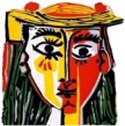
[ We must be careful not to be confused about the essential meaning of the gospel... Listen to the podcast (below) discussing the role of the law in the life of a follower of Yeshua... ]
11.06.17 (Cheshvan 17, 5778) Often it seems that we take one step forward, two steps back, revisiting the waste places of our old thinking and feeling the sting our character defects... Unfortunately this experience is common enough, since we often forget that change does not come from "reforming" the old nature, but by trusting that God makes all things new, and reckoning that our old nature is dead, buried and gone in Messiah (Gal. 2:20). Should we forget this and attempt to rectify the incurable, however, it is inevitable that we will be scandalized over our old depravity and we will need to go back to the beginning. However do not despair, dear one. The first step is most decisive. A chasid once lamented to the Baal Shem Tov that though he worked hard to be observant in his faith, he was still an sinful, ordinary and ignorant man. "Not true," said the Baal Shem Tov. "You now realize that you are a sinful, ordinary, and ignorant man, and that is an improvement" (Socrates would have agreed). Likewise Yeshua came not save the so-called righteous, but sinners to repentance (Mark 5:32). The way of healing is to going back to the beginning, turning to God in our need of heart and confessing the truth that in God alone is our salvation.
Where it is written, "How long shall I take counsel in my soul, having sorrow in my heart daily" (Psalm 13:2), the sages remark that just as long as we take counsel in our own soul there will be such sorrow, since only after we realize that no further counsel can help us do we give up and confess our need for God's salvation. Therefore בְּטַח אֶל־יְהוָה בְּכָל־לִבֶּךָ, "trust in the LORD with all your heart, and do not lean on your own understanding" (Prov. 3:5). Mammash - trust in the LORD!
Yeshua does not represent the "Second Coming of Moses"; nor did our Savior die on the cross so that we would become entangled in the old ways of thinking and being... Following Yeshua is not a religion of "moral reformation" or self-improvement designed to propitiate us before God. No, forever no! Yeshua is LORD and Master and we find new life in His acts of deliverance done on our behalf and for our benefit. The temptation is always to go back to the "law of sin and death" (i.e., the principle of self-justification), but as Luther once said: "The sin underneath all our sins is the lie of the serpent that we cannot trust the love and grace of Christ and that we must take matters into our own hands." Dear friends, we never get past our need for the cross... the crucified life is the way of sanctification.
Do not lie to one another since you have "stripped off" and "disarmed" (ἀπεκδύομαι) the old nature with its practices" (Col. 3:9); but "clothe yourself with the new nature that has been created in God's image – in righteousness and holiness that comes from truth" (Eph. 4:24).
The Life of Sarah... חיי שרה
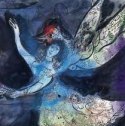
11.05.17 (Cheshvan 16, 5778) Our Torah reading for last week (i.e., Vayera) told how God was faithful to Abraham and Sarah by miraculously giving them a son (Isaac) in their old age. Nonetheless, Abraham faced his greatest test of all by being asked to offer up his promised child as a sacrifice on Mount Moriah, the place of the future Temple. On account of his willingness to obey, God promised He would multiply Abraham's offspring as the stars of heaven and that in his seed (singular) all the nations of the earth would be blessed.
This week's Torah portion is called Chayei Sarah (חיי שרה), the "life of Sarah," though it begins (paradoxically) with the account of her death, and tells how the first great matriarch of the Jewish people was buried in the Cave of Machpelah in Hebron, a burial site which Abraham had purchased from Ephron the Hittite (Gen. 23:1-20). Since the account of Sarah's death is given just after the account of the near-sacrifice of Isaac (i.e., the Akedah), some of the sages link the events together, suggesting that the shock of the loss of her beloved son at the hand of her husband was just too much for her to bear...
After Sarah was buried in Hebron, Abraham sought a wife for his son by commissioning his faithful servant Eliezer (whom Abraham had originally thought would be his heir), to go among his relatives living in Mesopotamia to seek for a bride for Isaac. Eliezer (i.e., אֱלִיעֶזֶר, lit., "My God will help") then set out on the 550 mile journey to Haran (also called the City of Nahor and the place where Abraham's father died), taking ten camels laden with gifts in search of a suitable bride. Providentially, and in answer to his prayer, as soon as Eliezer reached the city of Nahor he encountered Abraham's grand niece Rebekah drawing water at a well, where she graciously provided water for him and for his ten camels, thereby confirming that she was God's choice for Isaac.
Strangers to this World...
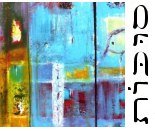
11.03.17 (Cheshvan 14, 5778) God's people are "strangers" in this world; they are estranged and live as "resident aliens" -- here, yet not here.... Thus Abraham said to the sons of Chet: "I am a 'stranger and sojourner' (גֵּר־וְתוֹשָׁב) among you; sell me a burial site..." (Gen. 23:4), and likewise King David confessed: "For we are strangers with You (כִּי־גֵרִים אֲנַחְנוּ לְפָנֶיךָ) and sojourners like our fathers; our days on earth are like a shadow (כַּצֵּל יָמֵינוּ) without abiding (1 Chron. 29:15). Faith affirms that underlying the surface appearance of life is a deeper reality that is ultimately real and abiding. It "sees what is invisible" (2 Cor. 4:18) and understands (i.e., accepts) that the "present form of this world is passing away" (1 Cor. 7:31). The life of faith therefore calls us to live as toshavim - sojourners - who are at an infinite "distance" from the world of appearances and who seek the Eternal. The holiday of Sukkot reminds us that we are just passing through this world, as we look forward to our real home in heaven (Heb. 11:9-10). "O You who are at home deep within my heart, enable me to join you deep in my heart."
Shabbat shalom, dear friend.... May the LORD comfort you and bless all your ways...
Teaching our Children...

11.03.17 (Cheshvan 14, 5778) "For I know him, that he will command his children and his household after him, and they shall keep the way of the LORD: to do charity and judgment" (Gen. 18:19). Abraham was specifically chosen by God because he knew that Abraham would be careful to share the truth of faith with his children, thereby transmitting and preserving the godly heritage. This is called chinuch ha'banim (חינוך הבנים) in Jewish tradition, the education of children. The sages note that the word "I know him" (יְדַעְתִּיו) connotes endearment and intimacy... Teaching children the "way of the LORD (דֶּרֶךְ יְהוָה)" is a great blessing in the eyes of heaven, and it is of course one of our most profound duties as parents, as it says in the Shema (Deut. 6:7). The word "chinuch" means "dedication," in particular, establishing a connection with the truth of God. A Hebrew word for teacher or educator is "mechanech" (מְחַנֵך), a word that derives from the Hebrew word for grace (חֵן). A godly teacher will help you establish a connection with God by means of God's grace.
חֲנךְ לַנַּעַר עַל־פִּי דַרְכּוֹ
גַּם כִּי־יַזְקִין לא־יָסוּר מִמֶּנָּה
cha·nokh · la·na·ar · al-pi · dar·ko
gam · ki-yaz·kin · lo-yas·ur · mim·men·ah

"Train up a child in the way he should go:
and when he is old, he will not depart from it" (Prov. 22:6)

Hebrew Study Card
The Ram of God...
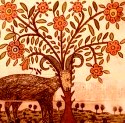
[ The following entry is related to this week's Torah reading, parashat Vayera.... ]
11.03.17 (Cheshvan 14, 5778) Consider how important was the ram that was substituted for Isaac... Had Isaac indeed been sacrificed on the altar, the nation of Israel would never have come into existence, and therefore the Messiah Himself would not have come. Therefore God's provision of the ram was meant to substitute and deliver all of Israel, and Isaac's willingness to offer his life foretells the passion and sacrifice of Yeshua. The sages say that the "ashes" of Isaac are gathered before the Throne of Glory, as if his willingness to offer himself is memorialized there forever. However, it is thanks to the ram (i.e., the lamb of God), that both Isaac and his merit as an offering survived the great test. Worthy is the Lamb who was slain! The cross is forever before God's Throne of Grace for us, chaverim.
In light of the sacrifice of Abraham's "only son" Isaac upon the altar at Moriah (i.e., the Akedah), we have all the more reason to affirm the glory of Yeshua our Messiah, the great Lamb of God (שֵׂה הָאֱלהִים) who takes away the sins of the world:
רָאוּי הַשֶּׂה הַטָּבוּחַ לְקַבֵּל גְבוּרָה
עשֶׁר וְחָכְמָה וְכּחַ וִיקַר וְכָבוֹד וּבְרָכָה
ra·uy · has·seh · ha·ta·vu·ach · le·ka·bel · ge·vu·rah,
o·sher · ve·chokh·mah · ve·ko·ach · vi·kar · ve·kha·vod · uv·ra·kha

"Worthy is the Lamb who was slain, to receive power and wealth and wisdom
and might and honor and glory and blessing" (Rev. 5:12)

Download Reading Card
Note: for more on this, see the "Passion of Isaac."
Covenant and Love...

11.03.17 (Cheshvan 14, 5778) In Genesis chapter 17, God confirmed his covenant with Abraham by giving him the rite of circumcision, that is, brit milah (בְּרִית מִילָּה), a term that literally means "covenant of the word" (מִילָּה means "word" in Hebrew). It is important to note that the rite of circumcision never was intended to effect the promise of God but only to attest to it. Circumcision served as sign (אוֹת) or token of faith in the word of the LORD, that is, in God's loving promise. We see the connection by noting that the word "covenant" (i.e., brit: בְּרִית) appears exactly 13 times during this dramatic episode (i.e., Gen. 17:1-22), which is the same numeric value as the Hebrew word for love (i.e., ahavah: אַהֲבָה). Further note that the last occurrence of the word "covenant" in this section concerns God's exclusive choice of Isaac, Abraham's only true heir, the promised child who was chosen to be the "sacrificed seed" (Gen. 17:21). Indeed the very first time the word "love" appears in the Bible occurs when God asks Abraham to take his son, his "beloved" son, and to offer him as a whole burnt offering (Gen. 22:2), a clear picture of the message of Yeshua the Messiah:
"Please take your son... קַח־נָא אֶת־בִּנְךָ
your only (special, unique) son... אֶת־יְחִידְךָ
the one whom you love... אֲשֶׁר־אָהַבְתָּ
even Isaac... אֶת־יִצְחָק
and go to the land of Moriah and offer him as a burnt offering.
Note: For more on this subject, see "The Gospel According to Moses," "The Seed of Abraham," "The Sacrificed Seed," and related links on the Akedah.
The Temptation of Grace...

11.03.17 (Cheshvan 14, 5778) Since there are certain "Messianic" ministries that teach false doctrine, it is vital to remind ourselves that the righteousness of God is manifested apart from the law (χωρὶς νόμου), and that this righteousness was clearly witnessed by the law and the prophets (Rom. 3:21). The Apostle Paul warns that those who attempt to mix the old and new covenants are spiritual adulterers (Rom. 7:4-ff). After all, the goal of the Torah was the advent of the New Covenant given in Messiah (Gal. 3:17-19). The law was given to lead us to the Messiah and His Kingdom rule (Gal. 3:23-26), and indeed, the glory of the Torah of Moses was destined to fade away (2 Cor. 3:3-11), just as its ritual center (i.e., the Tabernacle/Temple) foreshadowed the greater Substance of the priesthood of God (Heb. 10:1; 13:10). There is really no ambiguity here: "Now we are released from the law, having died to that which held us captive, so that we serve in the new way of the Spirit and not in the old way of the written code (Rom. 7:6). "For what the law could not do, in that it was weak through the flesh, God sending his own Son in the likeness of sinful flesh, and for sin, condemned sin in the flesh: That the righteousness of the law might be fulfilled in us, who walk not after the flesh, but after the Spirit" (Rom. 8:3-4).
Note: For more on this important subject, please see "The Temptation of Grace."
The Way of the LORD...
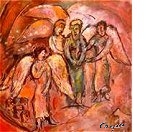
[ The following entry is related to this week's Torah reading, parashat Vayera... ]
11.03.17 (Cheshvan 14, 5778) From our Torah portion this week (i.e., parashat Vayera) we note that after delivering the announcement of the coming heir to both Abraham and Sarah, the three angels set out to finish their mission (Gen. 18:1-16). Abraham escorted them on their way. The chief Angel (i.e., the Angel of the LORD) then rhetorically asked his two angelic companions, "Should I hide from Abraham what I am about to do (i.e., go to Sodom), seeing that Abraham shall surely become a great and mighty nation, and all the nations of the earth shall be blessed in him? For I know him (כִּי יְדַעְתִּיו), that he will command his children and his household after him, and they shall keep the way of the LORD (דֶּרֶךְ יהוה), to do charity and justice (לַעֲשׂוֹת צְדָקָה וּמִשְׁפָּט); that the LORD may bring upon Abraham that which he has spoken of him" (Gen. 18:17-19). Notice here that the LORD commends Abraham because he would instruct his family in the way of the LORD (דֶּרֶךְ יהוה), namely, to do tzedakah (i.e., charity, righteous giving) and to promote justice in the earth...
When we recite the Shema, we repeat the admonition to follow Abraham's example: "these words that I command you today shall be on your heart, and you shall teach them diligently to your children (וְשִׁנַּנְתָּם לְבָנֶיךָ), and shall talk of them when you sit in your house, and when you walk by the way, and when you lie down, and when you rise..." (Deut. 6:5-7). We know however, that though Abraham had several sons, we call upon the the God of Isaac (Gen. 28:13), and likewise, though Isaac had two sons, Jacob and Esau, but we call upon the God of Jacob (Exod. 3:6). We are responsible to instruct our children to keep the way of the LORD, though we must entrust the spiritual results to God's hands....
Waking Up in Time...
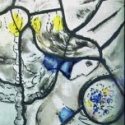
11.02.17 (Cheshvan 13, 5778) Our life in this world will end far sooner than we expect, and then what will become of us? I am not here thinking of the end of "the" world, but rather the end of your world - when you will die and face the light of eternity. Today, this moment, you are on the way, going someplace; your "latter days" are already come... If you are not prepared today, how will you be better prepared tomorrow? Today is the day of salvation, the hour that matters most. Learn to die to the world now, to let go of what presently holds you captive, so that you are free to meet that which forever shall come. Don't put off genuine teshuvah: turn while there is still time. And may God give us mercy to say from the heart: "For me to live is Messiah, and to die is gain" (Phil. 1:21).
The Sins of Sodom...

[ The following entry is related to this week's Torah reading, parashat Vayera.... ]
11.02.17 (Cheshvan 13, 5778) From our Torah portion this week we read: "And the LORD said, 'The outcry of Sodom and Gomorrah is indeed great, and their sin is exceedingly grave...'" (Gen. 18:20). But what was the sin of Sodom and Gomorrah? Why did God destroy the two cities? Was it because the people there refused to show hospitality to the angelic visitors (as is claimed by some), or was it because of some ongoing sin of the people?
Though the sin of Sodom undoubtedly included the practice of sexual perversion (called "strange flesh" in the Book of Jude), such behavior was symptomatic of a nihilistic culture that glorified violence, despised moral authority and spiritual truth, and practiced the exploitation of others. Throughout the Scriptures "Sodom" symbolically represents gross immorality, depravity, and inevitable judgment from heaven. For example, the prophet Ezekiel later wrote of Judah: "Behold, this was the guilt of your sister Sodom: she and her daughters had arrogance, abundant food, and careless ease, but she did not help the poor and needy. Thus they were haughty and committed abomination (תּוֹעֵבָה) before me; therefore I removed them when I saw it" (Ezek. 16:49-50). The New Testament refers to the fate of Sodom as "a fearful example of the everlasting fire of retribution" (Jude 1:7) -- the destructive result of spiritual anarchy, lawlessness, deviancy, perversion, and trauma (2 Pet. 2:6-10). Thankfully there is real hope for those who seek to escape from the wrath to come by turning to God and trusting in his healing power of salvation, though it is only a "remnant" that find true deliverance (Matt. 7:14). Speaking of the final salvation of Israel, the Apostle Paul quotes Isaiah: "If the LORD of Hosts hadn't left us a few survivors, we'd be as desolate as Sodom, doomed just like Gomorrah" (Isa 1:9; Rom. 9:29).
In this connection it should be noted that the word "sodomy" involves any form of violence, perversion, exploitation, or lawless expression of sexuality regardless of gender... In general, it is more helpful to think of it as a code word for egregious sin, "in-your-face" spite toward God, defiant immorality that celebrates spiritual anarchy, moral nihilism, and death... Adultery, fornication, sexual perversions, viewing pornography (i.e., the lust of the eyes), covetousness, gluttony, arrogance (idolatry), unbridled anger (rage), sloth, worshiping the things of this world (i.e., fads, trendy TV shows, sports idols, the world's value system), and so on, all may be called "sodomy." Whenever we consider such things, it is better to look at how we are healed rather than what makes us sick.... The answer in every case to the trauma of the sinful heart is to turn to God and ask for deliverance in the name of Yeshua.
The world and its "group-think" always calls for the abolition of individual conscience. Like the culture of ancient Sodom, today the great sin is to exercise earnest conviction that transcendental moral authority and truth exist, in spite of of the world's "homogenizing" value system... Indeed, the only thing regarded as "intolerable" in the devil's world is the objection that people have a supposed "liberty" to sin in whatever way they please. However, tolerating sin in a world ripe for judgment is a tacit form of "collaboration" with the enemy (James 4:4). The LORD is clear on this point: "Woe to those who call evil good and good evil, who put darkness for light and light for darkness, who put bitter for sweet and sweet for bitter! Woe to those who are wise in their own eyes, and who are shrewd in their own sight!" (Isa. 5:20-21).
The "original sin," that is, eating from the Tree of Knowledge of good and evil, meant that man sought to transcend God's will to determine what is valuable, true, beautiful, and so on. Man became autonomous, "the measure of all things." Such was the "logical" method of the German idealism of Kant and Hegel, which led to way for Karl Marx, Friedrich Nietzsche, and Adolf Hitler to unleash their nightmares upon the earth. And this ideology behind the cynical postmodern claim that "good and evil" are tools to express political control... Today, more than ever before, the world is like "Sodom," and therefore ripe for judgment from heaven.
And the judgment of God indeed came upon the moral anarchy of that realm... After the angels rescued Lot (and his immediate family), we read "then the LORD rained on Sodom and Gomorrah sulfur and fire from the LORD out of heaven. And he overthrew those cities, and all the valley, and all the inhabitants of the cities, and whatever grew on the ground" (Gen. 19:24-25). The sages note the word translated "overthrew" is vayahafokh (וַיַּהֲפךְ), which means "overturned," suggesting that besides the fire and brimstone that rained down from the sky, an enormous earthquake engulfed the plain, forming a crater filled with salt that became known as the "Dead Sea" (ים המלח).
Eyes of the Heart...

11.02.17 (Cheshvan 13, 5778) The Hebrew word for "seeing" (ra'ah) is related to the word for "fear" (yirah), suggesting that when we really see life as it is, we will be filled with wonder and awe over the glory of it all. Every bush will be aflame with the Presence of God and the ground we walk upon shall suddenly be perceived as holy (Exod. 3:2-5). Nothing will seem small, trivial, or insignificant. It is in this sense that we are to serve the LORD with "fear and trembling" (φόβοv καὶ τρόμοv), that is, with an inner awareness of the sanctity and sacredness of life itself (Phil. 2:12-13). Da lifnei mi atah omed: "Know before whom you stand!" We must rouse ourselves and become aware... Sin puts us to sleep, numbs our minds and hearts, and blinds us to the radiance of divine revelation. When we see life as it is, with the "eyes of the heart" (Eph. 1:18), we will be filled with wonder and awe over the mystery of life itself. "Fearing" (יִרְאָה) and "seeing" (רָאָה) will be linked and unified.
Power to Change...
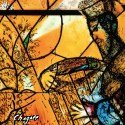
11.02.17 (Cheshvan 13, 5778) When King David cried out, lev tahor bera-li, Elohim: "Create in me a clean heart, O God" (Psalm 51:10), he did not use the Hebrew word yatzar (יָצַר), which means to "fashion" or "form" something from preexisting material, but he instead used the word bara (בָּרָא), a verb exclusively used to refer to God's creation of the cosmos (Gen. 1:1). David understood that no amount of reformation of his character would be enough, and instead appealed to that very power of God that created the worlds yesh me'ayin (יֵשׁ מֵאַיִן), "out of nothing." Such was the nature of the remedy required...
לֵב טָהוֹר בְּרָא־לִי אֱלהִים
וְרוּחַ נָכוֹן חַדֵּשׁ בְּקִרְבִּי
lev · ta·hor · be·ra·li · E·lo·him,
ve·ru·ach · na·khon · cha·desh · be·kir·bi

"Create for me a pure heart, O God,
and renew a right spirit within me"
(Psalm 51:10)

Hebrew Study Card
Yeshua taught, "Blessed are the pure in heart, for they shall see God" (Matt. 5:8). The Greek word translated "pure" is katharos (καθαρός), sometimes used describe the cleansing of a wound (catharsis), or to describe the unalloyed quality of a substance revealed through refining fire. Metaphorically, then, purity of heart refers to separation from the profane - singleness of vision, wholeheartedness, passion, and focused desire for the sacred. As we center our affections on Yeshua, we become pure in heart -- i.e., unified, made whole, and healed of our inner fragmentation. We see the Lord both in this world, through his effects, and then panim el panim (פָּנִים אֶל־פָּנִים), "face to face," in the world to come. Our hope purifies us for that coming great day of full disclosure (1 John 3:2-3; Heb. 12:14).
If we are impure of heart, we will be inwardly divided, unfocused, fragmented, filled with destabilizing anxiety, envy, unresolved hurt, anger, and so on. More tragically, because we seek to escape ourselves, we will be devoid of a true center, without a focal point or abiding purpose, and therefore we will be lost to ourselves, wandering and without rest...
The Work of Faith...

11.01.17 (Cheshvan 12, 5778) James the Righteous said that Abraham was "justified by works when he offered his son Isaac upon the altar" (James 2:21), but surely this refers to the work of faith (τό ἔργον τῆς πίστεως) and not to the works of the law (מַעֲשֵׂי הַתּוֹרָה), since the Torah explicitly prohibited human sacrifice (Gen. 9:5), and likewise the Angel of the LORD restrained Abraham's hand during the great test of faith (Gen. 22:12). When James therefore stated that Abraham was declared righteous (i.e., justified) by his works, he implied that our actions ultimately reveal the inner life of faith. On the other hand, the apostle Paul's seemingly contrary statement that Abraham was not justified by works (see Rom. 4:1-3) refers to his unwavering confidence in God's promise that his descendants would be as numerous as the stars in the heavens (Gen. 15:1-6). There is no real contradiction, then, since the two apostles were referring to two different episodes in their discussion of justification... As Yeshua said, "This is the work of God, that you believe in the One whom He has sent" (John 6:29).
The life of faith is inherently paradoxical, as Kierkegaard noted: "Ethically speaking, what Abraham planned to do was to murder Isaac; religiously, however, he was willing to sacrifice Isaac. In this contradiction lies the very anguish that can indeed make anyone sleepless. And yet without that anguish Abraham is not the one he is. Neither would faith be what it is." Although Abraham understood that God must be obeyed, he also understood that human sacrifice was immoral, and hence his struggle represented the collision between the imperative of reason and the imperative of faith. Choosing to heed the voice of reason (i.e., the "ethical," the "universal") over the personal voice of God created a state of "fear and trembling" and a sense of being unable to communicate his passion and mission to others.
"God cannot stand good works in the sense of earning merit. Yet good works are required. They shall be and yet shall not be. They are necessary and yet one ought humbly to ignore their significance or at least forget that they are supposed to be of any significance. Good works are like a child giving his parents a present, purchased, however, with what the child has received from his parents. All the pretentiousness which otherwise is associated with giving a present disappears when the child understands that he has received from his parents the gift which he gives to them."
As Kierkegaard further commented: "Faith's conflict with the world is not a battle of thought with doubt, thought with thought. It is a battle of character. The person of faith is a person of character who does not insist upon comprehending everything. Now comes the conflict. The world insists that to believe what you cannot comprehend is not only blind obedience but obscurantism, stupidity, and so on. The world wants to alarm the believer against such foolishness. This is precisely why faith is a task for the person of character."
Prayer and Humility...

11.01.17 (Cheshvan 12, 5778) "Abraham answered and said, "Behold, I have undertaken to speak to the Lord, I who am but dust and ashes" (עָפָר וָאֵפֶר, Gen. 18:27). This teaches that we cannot draw near to God apart from profound humility, since God's truth is revealed to the meek and lowly of heart but remains hidden from the proud (James 4:6). As it is written: "For this is what the high and lifted up One says, the One who abides forever, whose Name is Holy (קָדוֹשׁ): "I dwell in a high and holy place, but also with the broken and lowly of spirit, to revive the spirit of the lowly (i.e., ruach shefalim: רוּחַ שְׁפָלִים), and to revive the heart of the crushed" (i.e., lev nidka'im: לֵב נִדְכָּאִים) [Isa. 57:15]. Here we learn that God gives life (revives) to those who are "lowly in spirit" (שְׁפַל־רוּחַ), that is, to those who understand their own nothingness and complete dependence on Him for life... Indeed, the "heart of the crushed" (לֵב נִדכֶּה) refers to being crushed "to the dust" -- the same word (dakka: דַּכָּא) is used to describe how Yeshua was "crushed for our iniquities" (see Isa. 53:10). William James called this deep work of the spiritual life "Zerrissenheit," a term that can be translated as "torn-to-pieces-hood," or a state of being utterly broken and in disarray... From the point of view of our dependence on God for salvation, "dakka" refers to humility and contrition we express in light of God's unmerited favor and love for our souls. We humbly identify with the death of Messiah offered on our behalf; we find healing and acceptance in the Presence of the One who was torn to pieces and made dust for our merit. Humility (עֲנָוָה) is essential to awareness of God in the truth. Shuvah Yisrael!
כִּי כה אָמַר רָם וְנִשָּׂא שׁכֵן עַד וְקָדוֹשׁ שְׁמוֹ
מָרוֹם וְקָדוֹשׁ אֶשְׁכּוֹן וְאֶת־דַּכָּא וּשְׁפַל־רוּחַ
לְהַחֲיוֹת רוּחַ שְׁפָלִים וּלְהַחֲיוֹת לֵב נִדְכָּאִים
kee · khoh · a·mar · rahm · ve·nee·sah · sho·khen · ahd · ve·ka·dohsh · she·moh
ma·rohm · ve·ka·dosh · esh·kohn · ve·et · da·kah · oosh·fahl · roo·ach
le·ha·cha·yot · roo·ach · she·fa·leem · oo·le·ha·cha·yoht · lev · need·ka·eem

"For this is what the high and lifted up One says, the One who abides forever,
whose Name is Holy: "I dwell in a high and holy place, but also with the broken
and lowly of spirit, to revive the spirit of the lowly and to revive the heart of the crushed."
(Isa. 57:15)

Download Study Card
|































